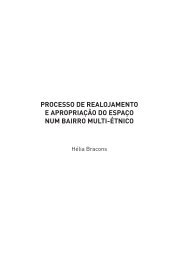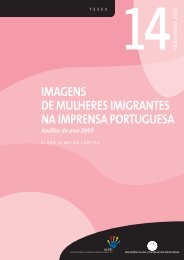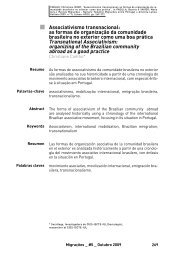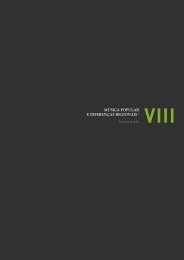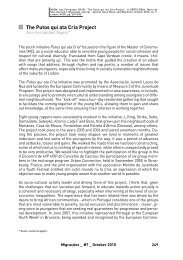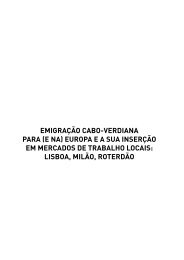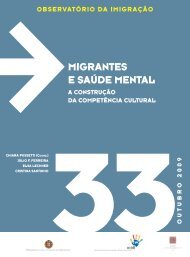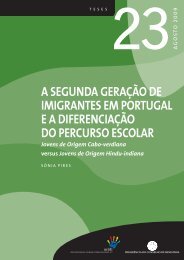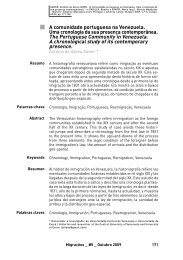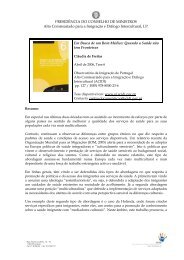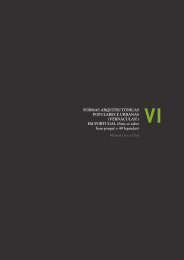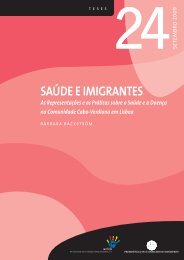Revising citizenship: migration and fado in the play of identities in ...
Revising citizenship: migration and fado in the play of identities in ...
Revising citizenship: migration and fado in the play of identities in ...
You also want an ePaper? Increase the reach of your titles
YUMPU automatically turns print PDFs into web optimized ePapers that Google loves.
CÔRTE-REAL, Maria de São José (2010), “<strong>Revis<strong>in</strong>g</strong> <strong>citizenship</strong>: <strong>migration</strong> <strong>and</strong> <strong>fado</strong> <strong>in</strong> <strong>the</strong> <strong>play</strong><strong>of</strong> <strong>identities</strong> <strong>in</strong> <strong>the</strong> United States”, CÔRTE-REAL, Maria de São José (ed.), Migrações Journal- Special Issue Music <strong>and</strong> Migration, October 2010, no. 7, Lisbon: ACIDI, pp. 73-96<strong>Revis<strong>in</strong>g</strong> <strong>citizenship</strong>: <strong>migration</strong> <strong>and</strong> <strong>fado</strong> <strong>in</strong> <strong>the</strong><strong>play</strong> <strong>of</strong> <strong>identities</strong> <strong>in</strong> <strong>the</strong> United StatesMaria de São José Côrte-Real*AbstractKeywordsMusic relaxes <strong>and</strong> awakens. Its <strong>in</strong>fluence <strong>in</strong> human behaviourssome times produces unexpected results even for <strong>the</strong> own. Fadoperformance among Portuguese migrants <strong>in</strong> <strong>the</strong> US, <strong>in</strong> 1990,awakened reactions question<strong>in</strong>g identity <strong>and</strong> <strong>citizenship</strong> representation.Cultural policies, music repertoires, perform<strong>in</strong>g details <strong>and</strong><strong>in</strong>dividual op<strong>in</strong>ions <strong>in</strong> migrant <strong>and</strong> non-migrant contexts <strong>in</strong>spired<strong>the</strong> open <strong>in</strong>terpretation I propose <strong>of</strong> <strong>in</strong>teractions between <strong>the</strong> establishednationalist narratives <strong>and</strong> <strong>the</strong> renewed social experiences<strong>in</strong> transnational context. I argue for an <strong>in</strong>terpretation <strong>of</strong> <strong>the</strong> musicculture <strong>in</strong> migrant context that contributes towards an underst<strong>and</strong><strong>in</strong>g<strong>of</strong> <strong>in</strong>tercultural relationships <strong>in</strong> <strong>the</strong> contemporary socialdevelopment.Migration, transnational <strong>citizenship</strong>, identity, music, dance, <strong>fado</strong>.* Associate Researcher, Program Science (Fundação para a Ciência e Tecnologia), at<strong>the</strong> Instituto de Etnomusicologia, Faculdade de Ciências Sociais e Humanas, UniversidadeNova de Lisboa (saojose@fcsh.unl.pt).Migrações _ #7 _ October 201073
<strong>Revis<strong>in</strong>g</strong> <strong>citizenship</strong>: <strong>migration</strong> <strong>and</strong> <strong>fado</strong> <strong>in</strong> <strong>the</strong> <strong>play</strong><strong>of</strong> <strong>identities</strong> <strong>in</strong> <strong>the</strong> United StatesMaria de São José Côrte-RealIntroductionThe Gr<strong>and</strong>e Noite de Fados, regularly performed among Portuguese migrants <strong>in</strong> <strong>the</strong>US, <strong>in</strong>cluded d<strong>in</strong>ner, musical performance <strong>and</strong> nationalist memory. I studied it, not<strong>in</strong>g<strong>the</strong> systematic retention <strong>of</strong> musical models <strong>in</strong> performance. I compared it with whathappened <strong>in</strong> Lisbon, through repertoire analysis; observation <strong>of</strong> perform<strong>in</strong>g details,sound material, voice character <strong>and</strong> <strong>in</strong>dividual gesture among o<strong>the</strong>r expressive behaviourpatterns visible among musicians, artists <strong>and</strong> audiences; analysis <strong>of</strong> <strong>in</strong>dividualop<strong>in</strong>ions <strong>and</strong> critical <strong>in</strong>formation held by performers as well as some members <strong>of</strong> <strong>the</strong>audiences. Fado celebrated <strong>the</strong> past, <strong>in</strong> a settled tradition <strong>of</strong> national representation.Someth<strong>in</strong>g however constra<strong>in</strong>ed <strong>the</strong> ambience suggest<strong>in</strong>g frustration. Marg<strong>in</strong>al <strong>the</strong>n,this strangeness is now at <strong>the</strong> centre <strong>of</strong> my <strong>in</strong>terest. What behaviours revealed thissensation? Were <strong>the</strong>y frustrated? What might <strong>the</strong> causes be? How did <strong>the</strong>y manifest<strong>the</strong>m? Why would <strong>the</strong>y experience that? Might <strong>the</strong> feel<strong>in</strong>g be productive?After study<strong>in</strong>g cultural policy <strong>and</strong> musical expression <strong>in</strong> <strong>the</strong> transition from dictatorshipto democracy <strong>in</strong> Portugal, where <strong>fado</strong> emerged as a constructed musical categoryfor / from nationalistic purposes (Côrte-Real, 2000), it became clear to me whyparticipants seemed divided <strong>in</strong> <strong>the</strong>ir feel<strong>in</strong>gs, rais<strong>in</strong>g <strong>the</strong> sensation I termed frustration.Disparate identity forces were <strong>play</strong><strong>in</strong>g <strong>in</strong> a way that <strong>the</strong> planned nationalistdemonstration vacillated before <strong>the</strong> <strong>in</strong>terpretive experience <strong>of</strong> performance. Welfare,attention to <strong>the</strong> o<strong>the</strong>r, happ<strong>in</strong>ess <strong>and</strong> critical awareness, among o<strong>the</strong>rs, prevail<strong>in</strong>gover nationalist notions stress<strong>in</strong>g sadness, lonel<strong>in</strong>ess, submission <strong>and</strong> jealousy, producedeffect. I propose an <strong>in</strong>terpretation <strong>of</strong> <strong>the</strong> event not<strong>in</strong>g <strong>the</strong> role <strong>of</strong> <strong>the</strong> behaviours<strong>in</strong> performance <strong>and</strong> <strong>the</strong> multifarious forces deal<strong>in</strong>g with <strong>in</strong>dividual identity to stress<strong>the</strong> importance <strong>of</strong> musical performance <strong>in</strong> <strong>the</strong> representation <strong>and</strong> <strong>in</strong>terpretation <strong>of</strong><strong>citizenship</strong>.M<strong>in</strong>d <strong>and</strong> body <strong>in</strong> performance …Wrapped <strong>in</strong> white blankets disposed side by side <strong>in</strong> several rows <strong>the</strong>y left a narrowcentral path. It was Penn Station <strong>in</strong> New York pass<strong>in</strong>g 4 a.m. on 25.03.1990. Homelesspeople used <strong>the</strong> sheltered hallway to sleep. Inhabitants <strong>of</strong> <strong>the</strong> city, bodies<strong>and</strong> <strong>the</strong> respective quiet m<strong>in</strong>ds, gave <strong>the</strong> public place a new use. 1M<strong>in</strong>d <strong>and</strong> body reactions <strong>in</strong> <strong>the</strong> public place emerge <strong>in</strong> this study on music performance<strong>and</strong> <strong>citizenship</strong> representation. Complex networks <strong>of</strong> memory <strong>in</strong>teract with newsocial circumstances shap<strong>in</strong>g <strong>the</strong> <strong>play</strong> <strong>of</strong> <strong>identities</strong> that migrant, <strong>and</strong> non-migrant,populations live everyday. Increas<strong>in</strong>g <strong>migration</strong> <strong>in</strong>tensifies <strong>in</strong>ter <strong>and</strong> <strong>in</strong>trapersonalrelationships. The experience <strong>of</strong> displacement, enriched by contact with novelty,74 Music <strong>and</strong> Migration
challenges established canons <strong>and</strong> leads us to question <strong>and</strong> rebuild ways <strong>of</strong> life. Thereference to <strong>the</strong>“global village <strong>in</strong> which we all live” requires reflection on <strong>the</strong> validity<strong>of</strong> <strong>the</strong> dist<strong>in</strong>ction <strong>of</strong> <strong>citizenship</strong> <strong>of</strong> national base. It is my aim to argue for <strong>the</strong> study <strong>of</strong>music among migrants, <strong>and</strong> <strong>fado</strong> performance <strong>in</strong> particular, to observe nuances <strong>and</strong>mean<strong>in</strong>gs <strong>of</strong> identity as a multipart perform<strong>in</strong>g, fluid <strong>and</strong> adaptable human characteristic,operat<strong>in</strong>g on <strong>in</strong>dividual <strong>and</strong> collective dimensions <strong>of</strong> each one’s life.Music performance is a multifaceted <strong>and</strong> dynamic human phenomenon, <strong>in</strong>volv<strong>in</strong>g ra<strong>the</strong>rcapricious <strong>and</strong> sometimes <strong>in</strong>tellectually elaborate, physical, aes<strong>the</strong>tical, social<strong>and</strong> symbolic dimensions, challeng<strong>in</strong>g barriers, amplify<strong>in</strong>g <strong>the</strong> voice <strong>of</strong> its producers<strong>and</strong> touch<strong>in</strong>g its receivers. It rends itself particularly effective for an <strong>in</strong>terpretive observation<strong>of</strong> <strong>citizenship</strong> representation <strong>in</strong> <strong>the</strong> <strong>in</strong>tercultural arena. In an approach to<strong>the</strong> concept <strong>of</strong> identity, acknowledg<strong>in</strong>g its fluidity <strong>and</strong> perform<strong>in</strong>g character (Hall <strong>and</strong>du Gay, 1996; Baumann, 1996), I present a Portuguese Night also billed as <strong>the</strong> Gr<strong>and</strong>Night <strong>of</strong> Fados <strong>in</strong> Newark, <strong>in</strong> 1990. Material for purposes <strong>of</strong> reference was collected <strong>in</strong>Lisbon, <strong>in</strong> <strong>the</strong> context <strong>of</strong> <strong>fado</strong> performances for tourists <strong>in</strong> <strong>the</strong> restaurants Adega Machado,which closed <strong>in</strong> 2009 after 72 years <strong>in</strong> bus<strong>in</strong>ess, <strong>and</strong> Adega Mesquita, founded<strong>in</strong> 1941 <strong>and</strong> still open. 2 I carried out field <strong>and</strong> archival work from 1993 to 2000, basedon <strong>the</strong> Archive <strong>of</strong> SNI (Secretariado Nacional de Informação [Secretariat <strong>of</strong> NationalInformation], <strong>the</strong>n Secretaria de Estado da Informação e Turismo [Secretary <strong>of</strong> Statefor Information <strong>and</strong> Tourism]) <strong>of</strong> <strong>the</strong> former Portuguese dictatorship.Paradigmatic <strong>in</strong>ter<strong>play</strong>s <strong>of</strong> behaviour <strong>in</strong>volv<strong>in</strong>g m<strong>in</strong>d <strong>and</strong> body, act<strong>in</strong>g <strong>in</strong> adversity,revealed identity dilemmas that, question<strong>in</strong>g old nationalist canons, gave way tonew <strong>in</strong>dividual <strong>in</strong>terpretations on <strong>citizenship</strong> representation. The Ethnomusicologyperspective, <strong>in</strong> which I am <strong>in</strong>scribed, studies music phenomena related with, amongo<strong>the</strong>rs, its hybrid character <strong>and</strong> national use. Inspir<strong>in</strong>g texts have been written about<strong>the</strong> role <strong>of</strong> music <strong>in</strong> <strong>the</strong> underst<strong>and</strong><strong>in</strong>g <strong>of</strong> change <strong>and</strong> <strong>in</strong> help<strong>in</strong>g social transformation.Among <strong>the</strong>m Music <strong>and</strong> <strong>the</strong> Global Order by Mart<strong>in</strong> Stokes identifies circulationacross cultural borders <strong>and</strong> <strong>the</strong> musical dynamics <strong>of</strong> <strong>in</strong>terculture (2004). In time <strong>of</strong>mass <strong>migration</strong> <strong>and</strong> electronic mediation that elected music as a key channel <strong>of</strong> expression,communication, amusement <strong>and</strong> pr<strong>of</strong>it mak<strong>in</strong>g, political use <strong>of</strong> this k<strong>in</strong>d <strong>of</strong><strong>in</strong>formed analysis will aid <strong>in</strong> human collaborative development. The action <strong>of</strong> decisionmakers <strong>in</strong> <strong>the</strong> design <strong>of</strong> effective public policies stemm<strong>in</strong>g models network<strong>in</strong>g musicresearch, animation, experimentalism <strong>and</strong> diffusion (Carvalho, 2010) will surely benefitfrom <strong>the</strong> streng<strong>the</strong>n<strong>in</strong>g <strong>of</strong> such pursuit.The Portuguese Night was fruitful. We were enter<strong>in</strong>g <strong>the</strong> third month <strong>of</strong> contact.Besides listen<strong>in</strong>g, enjoy<strong>in</strong>g <strong>the</strong> ambience, eat<strong>in</strong>g, record<strong>in</strong>g <strong>the</strong> <strong>fado</strong> repertoire <strong>and</strong>speach, note tak<strong>in</strong>g <strong>and</strong> talk<strong>in</strong>g to develop <strong>in</strong>terview<strong>in</strong>g strategic actions, my participantobservation took me <strong>in</strong>to levels <strong>of</strong> significance, whose decod<strong>in</strong>g clues <strong>and</strong> underst<strong>and</strong><strong>in</strong>gtake eventually some time still. The Portuguese Night at <strong>the</strong> restaurantSerra da Estrela 3 <strong>in</strong> Newark, New Jersey, next to New York City, was, <strong>in</strong> 1990, ra<strong>the</strong>rcomplete. In <strong>the</strong> Portuguese community <strong>of</strong> <strong>the</strong> Ironbound district, is still today a referentialplace for <strong>fado</strong> <strong>in</strong> <strong>the</strong> US.Migrações _ #7 _ October 201075
As usual, <strong>the</strong> d<strong>in</strong>ner was served to <strong>the</strong> sound <strong>of</strong> music – <strong>of</strong> a homem orquestra 4 , ono<strong>the</strong>r occasions a conjunto 5 . At about 11p.m., <strong>the</strong> fadista <strong>and</strong> musicians 6 appeared,<strong>and</strong> <strong>the</strong> room fall silent, <strong>the</strong> first <strong>fado</strong> session took place. There were usually three <strong>of</strong>about 30’ each. Songs <strong>of</strong> sorrow, sadness, disappo<strong>in</strong>tment, jealousy, nostalgic nature<strong>of</strong> <strong>fado</strong> <strong>and</strong> poor ambience <strong>of</strong> ancient Lisbon were sung to <strong>the</strong> accompaniment <strong>of</strong> <strong>the</strong>guitar <strong>and</strong> <strong>the</strong> Portuguese guitar. The vocal style was as close as possible to a modelselected from pre-migrant memory. At <strong>the</strong> end <strong>of</strong> <strong>the</strong> session, <strong>fado</strong> performers left <strong>the</strong>“stage” space, without any k<strong>in</strong>d <strong>of</strong> raised platform, or even <strong>the</strong> room, <strong>and</strong> dance musicfollowed. With it, <strong>and</strong> suddenly, <strong>the</strong> atmosphere exchanged radically. The audiencedanced, laughed <strong>and</strong> spoke loud. The unstressed ambience called for participation.Lambada reigned with all its exuberance. Eventually some o<strong>the</strong>r Lat<strong>in</strong> American hits<strong>and</strong> one or two items <strong>of</strong> Portuguese popular music made <strong>the</strong>ir way before ano<strong>the</strong>rlambada rendition, tirelessly repeated all night long. The danc<strong>in</strong>g periods lasted longerthan those <strong>of</strong> <strong>fado</strong>, about 50’ each. Dance <strong>and</strong> <strong>fado</strong> alternated as though after mak<strong>in</strong>g itthrough a tense session, a time <strong>of</strong> release was vital to cont<strong>in</strong>u<strong>in</strong>g with <strong>the</strong> event.The announcement, as usual, had been for a Gr<strong>and</strong>e Noite de Fados <strong>and</strong> all staged attentionseemed to concentrate on it. However, <strong>the</strong> night was clearly composed <strong>of</strong> twodifferent <strong>and</strong> apparently <strong>in</strong>dependent parts. The most participated <strong>and</strong> animated was<strong>the</strong> least valued. A somewhat related model <strong>of</strong> performance was <strong>the</strong>n observable,<strong>and</strong> still rema<strong>in</strong>s, <strong>in</strong> Lisbon, where <strong>in</strong> some Casas de Fado (restaurants called Houses<strong>of</strong> Fado) <strong>fado</strong> sessions are <strong>in</strong>terwoven with staged moments <strong>of</strong> folklore dance. In Lisbon,however, <strong>the</strong> audience did not participate. Most clients <strong>in</strong> <strong>the</strong> restaurants visited<strong>in</strong> <strong>the</strong> summer <strong>of</strong> 1990 were tourists, ei<strong>the</strong>r non-nationals or from o<strong>the</strong>r regions <strong>of</strong>Portugal, much less engaged <strong>in</strong> <strong>the</strong> performance than <strong>the</strong> US counterparts.My study <strong>the</strong>n led me to disregard <strong>the</strong> danc<strong>in</strong>g <strong>in</strong>termissions between <strong>the</strong> <strong>fado</strong> sessions.Caught up by <strong>the</strong> relaxed ambience <strong>of</strong> <strong>the</strong> dance sessions, I capitalised on<strong>the</strong>m as <strong>in</strong>terview<strong>in</strong>g time. It was dur<strong>in</strong>g <strong>the</strong>se highly participative moments <strong>of</strong> <strong>in</strong>tensivebody reaction that I collected <strong>the</strong> comparatively <strong>in</strong>tensive m<strong>in</strong>d reactions <strong>of</strong> <strong>the</strong>participants regard<strong>in</strong>g <strong>the</strong> <strong>in</strong>terpretation whe<strong>the</strong>r <strong>of</strong> <strong>the</strong>ir own <strong>fado</strong> performances orthat <strong>of</strong> o<strong>the</strong>rs. As <strong>the</strong> focus <strong>of</strong> my study was established on <strong>the</strong> retention <strong>of</strong> musicalmodels <strong>in</strong> performance, my aims proved <strong>in</strong> tune with those declared by participants.My attitude <strong>of</strong> overlook<strong>in</strong>g <strong>the</strong> dance sessions seemed even welcome. The fieldworkstrategy entailed two aspects: on <strong>the</strong> one h<strong>and</strong>, my observation <strong>of</strong> <strong>the</strong> unstressedmoments <strong>of</strong> body priority was <strong>in</strong>terrupted by <strong>the</strong> lead<strong>in</strong>g research <strong>in</strong>terest <strong>in</strong> <strong>the</strong>event’s <strong>of</strong>ficially advertised product, <strong>fado</strong>; on <strong>the</strong> o<strong>the</strong>r h<strong>and</strong>, my <strong>in</strong>terviews, seek<strong>in</strong>g<strong>in</strong>tellectual response, clearly pr<strong>of</strong>ited from <strong>the</strong> relaxed ambience. The paradoxicalsituation <strong>in</strong> <strong>the</strong>se <strong>in</strong>termissions, when relaxed <strong>in</strong>formants tried to produce controlledanalytical descriptions <strong>of</strong> <strong>the</strong>ir own music behaviour, may have had some effecton <strong>the</strong> unexpected responses some answers revealed regard<strong>in</strong>g <strong>the</strong> motivation toperform <strong>fado</strong> <strong>and</strong> even <strong>the</strong> susta<strong>in</strong>ability <strong>of</strong> that form <strong>of</strong> representation <strong>of</strong> <strong>the</strong>ir Portuguese<strong>citizenship</strong>. Resonances <strong>of</strong> this ambivalence, nurtured by subsequent studieson cultural policy, musical expression <strong>and</strong> categorization dur<strong>in</strong>g <strong>the</strong> dictatorship <strong>in</strong>Portugal (Côrte-Real, 2000), renew<strong>in</strong>g my <strong>in</strong>terest on <strong>the</strong> reflection about <strong>fado</strong> performance<strong>in</strong> <strong>the</strong> migrant context, provided me with <strong>the</strong> foundations for this article on<strong>the</strong> <strong>in</strong>terpretation <strong>of</strong> <strong>citizenship</strong> representation.76 Music <strong>and</strong> Migration
Fado sessions took a formal structure <strong>in</strong> <strong>the</strong> US. As <strong>in</strong> <strong>the</strong> places visited <strong>in</strong> Portugal,<strong>the</strong>y started with an <strong>in</strong>strumental variação for viola (guitar) <strong>and</strong> guitarra (Portugueseguitar). Then <strong>the</strong> fadista – one or two hired per night – sang five to seven <strong>fado</strong>s.He/she announced <strong>the</strong> <strong>fado</strong>s’ names, jo<strong>in</strong><strong>in</strong>g <strong>the</strong> titles <strong>of</strong> <strong>the</strong> lyrics <strong>and</strong> those <strong>of</strong> <strong>the</strong>respective accompany<strong>in</strong>g musical patterns. In some cases he venerated names <strong>of</strong>known fadistas who used to s<strong>in</strong>g <strong>the</strong>m. Sometimes <strong>the</strong> fadista would solicit audienceparticipation to accompany him or her <strong>in</strong> a refra<strong>in</strong>. This happened <strong>in</strong> <strong>the</strong> last <strong>fado</strong>s <strong>of</strong>each session. If <strong>the</strong>re were fadistas <strong>in</strong> <strong>the</strong> audience, which was common, <strong>the</strong>y wouldprobably participate. Dur<strong>in</strong>g one <strong>in</strong>termission, <strong>the</strong> musicians would check <strong>the</strong> pitchfor <strong>the</strong>ir vocal range <strong>and</strong> <strong>in</strong> <strong>the</strong> last session <strong>the</strong> fadista would formally <strong>in</strong>vite <strong>the</strong>mto s<strong>in</strong>g two or three <strong>fado</strong>s each. Although <strong>the</strong> size <strong>of</strong> <strong>the</strong> rooms did not require it, allfadistas used a microphone.Dur<strong>in</strong>g sessions fadistas <strong>and</strong> musicians adopted a ra<strong>the</strong>r static, serious, as if saddenedposture, <strong>in</strong> a performance model that seemed to highlight <strong>in</strong>tellectual ra<strong>the</strong>rthan body expression. The audience also adopted a formal attitude <strong>and</strong> <strong>the</strong> sensationgiven was that <strong>of</strong> <strong>the</strong> fulfilment <strong>of</strong> some k<strong>in</strong>d <strong>of</strong> penitent ritual, loaded with symbolism.As expla<strong>in</strong>ed by participants, <strong>the</strong> Portuguese Night was <strong>the</strong> occasion for <strong>the</strong>expression <strong>and</strong> re<strong>in</strong>forcement <strong>of</strong> <strong>the</strong> cultural identity <strong>of</strong> nationalist <strong>in</strong>spiration, bothas <strong>in</strong>dividual <strong>and</strong> group activity. The symbolism was revealed for example <strong>in</strong> <strong>the</strong> oppositionbetween <strong>the</strong> k<strong>in</strong>d <strong>of</strong> performance context <strong>and</strong> structure. While <strong>the</strong> contextwas very <strong>in</strong>formal <strong>and</strong> even familiar – performers <strong>and</strong> audience members knew eacho<strong>the</strong>r well, most hav<strong>in</strong>g even strong personal ties – <strong>the</strong> structure <strong>of</strong> <strong>the</strong> performancewas formal. Previously prepared <strong>and</strong> cordially performed. When a member <strong>of</strong> <strong>the</strong>audience sang, he/she was formally <strong>in</strong>vited by <strong>the</strong> fadista over <strong>the</strong> microphone, afterrequest<strong>in</strong>g <strong>the</strong> permission <strong>of</strong> <strong>the</strong> restaurant’s owner. There were even<strong>in</strong>gs when,despite <strong>the</strong>re be<strong>in</strong>g only Portuguese speakers <strong>in</strong> <strong>the</strong> room, <strong>the</strong> fadista would address<strong>the</strong> small audience (less than 40 people), at <strong>the</strong> beg<strong>in</strong>n<strong>in</strong>g <strong>of</strong> <strong>the</strong> performance, <strong>in</strong>Portuguese, English, <strong>and</strong> French. This format, follow<strong>in</strong>g a model from pre-migrantsituations, <strong>in</strong>tended for foreign tourists <strong>in</strong> Lisbon, revealed one <strong>of</strong> <strong>the</strong> ambivalences<strong>of</strong> <strong>the</strong> event as it stressed <strong>the</strong> distance between performers <strong>and</strong> <strong>the</strong> audience <strong>in</strong> whatwas deemed locally to be a practice <strong>of</strong> proximity.There was though participation. That even<strong>in</strong>g, as usual, somewhat unnatural. Theaudience would s<strong>in</strong>g refra<strong>in</strong>s, from most well known <strong>fado</strong>s, <strong>and</strong> request specificnumbers, sung as an extra at <strong>the</strong> end <strong>of</strong> sessions. After a number <strong>of</strong> performances,someone felt <strong>the</strong> audience reaction was quite stereotyped. There were always bigovations, even when an <strong>in</strong>strument was accidentally but audibly out <strong>of</strong> tune, or whenone s<strong>in</strong>ger was not as good as <strong>the</strong> o<strong>the</strong>rs. After one such <strong>in</strong>stance, <strong>in</strong> justification, <strong>the</strong>fadista commented:“She likes to s<strong>in</strong>g, you know, <strong>and</strong> we are all equal, we have <strong>the</strong> same rights... After all <strong>the</strong>reare not so many fadistas <strong>in</strong> our community, so if we don’t welcome <strong>the</strong> voluntaries one <strong>of</strong><strong>the</strong>se days we will not have fadistas at all” (Miguel Valente, 7 personal <strong>in</strong>terview, Newark,24.03.1990, <strong>in</strong> Carvalho 1991:32). 8Migrações _ #7 _ October 201077
The audience revealed a keen desire for participation. Some <strong>in</strong>formants have stressed<strong>the</strong> importance <strong>of</strong> <strong>fado</strong> <strong>in</strong> <strong>the</strong> community as what <strong>the</strong>y called a natural manifestation<strong>of</strong> saudosismo (homesickness), <strong>the</strong> heavily loaded Portuguese yearn<strong>in</strong>g that is saidto express feel<strong>in</strong>gs <strong>of</strong> unity among participants, <strong>and</strong> which, as part <strong>of</strong> a romanticisedstrategy for nationalist propag<strong>and</strong>a, was said to be impossible to translate exactly<strong>in</strong>to o<strong>the</strong>r languages. These performances seemed <strong>the</strong>n to show a re<strong>in</strong>forcement<strong>of</strong> <strong>the</strong> group’s cultural coherence to national identity for <strong>the</strong> purpose <strong>of</strong> <strong>citizenship</strong>representation. Comment<strong>in</strong>g upon <strong>the</strong> reason to perform <strong>fado</strong>, one musician stated:“It is difficult to expla<strong>in</strong>, but for me <strong>fado</strong> symbolises Portugal. It seems that it says thatPortugal is here, with us. It is like blues for <strong>the</strong> black Americans. They love it as we love<strong>fado</strong>. If we pay attention we see that 90% <strong>of</strong> our texts are sad texts, <strong>the</strong>y are songs, <strong>the</strong>y aresad <strong>fado</strong>s that tell someth<strong>in</strong>g about <strong>the</strong> past. Each <strong>fado</strong> has a specific mean<strong>in</strong>g, someth<strong>in</strong>gfrom <strong>the</strong> daily life <strong>of</strong> <strong>the</strong> people... And because it is typically Portuguese, it is very importantthat we show it. It is <strong>the</strong> way we have to show our culture. We don’t have o<strong>the</strong>r ways <strong>of</strong> do<strong>in</strong>gso... From time to time <strong>the</strong> Portuguese Consulate organises shows <strong>of</strong> pa<strong>in</strong>t<strong>in</strong>gs <strong>and</strong> plasticarts. But this happens only once <strong>in</strong> a year or so. We, with <strong>the</strong> music, it is different; we have<strong>fado</strong> every weekend. We all work but we take some <strong>of</strong> our time, a weekend or a special dayjust for this. It is important we have to ma<strong>in</strong>ta<strong>in</strong> <strong>the</strong> tradition.” (Fern<strong>and</strong>o Costa, personal<strong>in</strong>terview, Newark, 13.04.1990, <strong>in</strong> Carvalho, 1991:78).The f<strong>in</strong>d<strong>in</strong>gs about <strong>the</strong> quantity <strong>of</strong> sad songs <strong>and</strong> <strong>the</strong> fact that <strong>the</strong>y relate to <strong>the</strong> past,seem to be presented by <strong>the</strong> musician as somehow strange reasons to keep <strong>the</strong>m <strong>in</strong><strong>the</strong>ir repertoire. “If we pay attention…” he says, as though we might be better <strong>of</strong>f notpay<strong>in</strong>g any. One may consider that <strong>the</strong> past experience <strong>of</strong> migrants is hard <strong>and</strong> so notso pleasurable to recall. Indeed, <strong>the</strong> explanation came soon after: “it is typically Portuguese,it is very important that we show it. It is <strong>the</strong> way we have to show our culture.We don’t have o<strong>the</strong>r ways <strong>of</strong> do<strong>in</strong>g so...” The f<strong>in</strong>al sentence, as an excuse, expla<strong>in</strong>s acerta<strong>in</strong> discomfort as if perform<strong>in</strong>g <strong>fado</strong> was perceived as an obligation to fulfil as ademonstration <strong>of</strong> Portuguese <strong>citizenship</strong>.One <strong>of</strong> <strong>the</strong> powers <strong>of</strong> music, visible on <strong>fado</strong> performance, is its potential to l<strong>in</strong>k <strong>in</strong>timate<strong>and</strong> public spheres <strong>of</strong> identity. The idea that <strong>fado</strong> is a very <strong>in</strong>timate expression,<strong>and</strong> that to <strong>in</strong>terpret it satisfactorily one has to have passed through specific sad <strong>and</strong>hurtful experiences <strong>of</strong> loss or o<strong>the</strong>r feel<strong>in</strong>gs such as resentment, was expressed bydifferent <strong>in</strong>formants. The expertise <strong>in</strong> conv<strong>in</strong>c<strong>in</strong>gly show<strong>in</strong>g <strong>the</strong>se feel<strong>in</strong>gs <strong>in</strong> publicwas seen as a sign <strong>of</strong> performance quality. In this sense, <strong>the</strong> audience appreciated<strong>and</strong> commented on <strong>the</strong> art <strong>of</strong> <strong>the</strong> fadista as part <strong>of</strong> his/her musical talent. In order tobe a true artist, <strong>the</strong> fadista should first <strong>of</strong> all feel whatever he/she is s<strong>in</strong>g<strong>in</strong>g about.The sonic quality <strong>of</strong> his/her voice is secondary <strong>in</strong> this context. Curiously enough, <strong>the</strong>concepts <strong>of</strong> music <strong>and</strong> art were aga<strong>in</strong> considered separately <strong>in</strong> this context <strong>of</strong> <strong>fado</strong>performance. The ages <strong>of</strong> audiences, as well as performers, ranged from around 30to 60 years, be<strong>in</strong>g considered mature <strong>in</strong> <strong>the</strong> community. A member <strong>of</strong> <strong>the</strong> audiencestressed:78 Music <strong>and</strong> Migration
“One needs to be mature <strong>in</strong> order to really underst<strong>and</strong> <strong>fado</strong>. You have to have had a grief ora deep sorrow <strong>in</strong> your life, ano<strong>the</strong>r woman <strong>in</strong> your life, you know, love displeasure, or someth<strong>in</strong>g<strong>of</strong> that sort.” (Antónia, personal <strong>in</strong>terview, Newark, 24.11.1990, <strong>in</strong> Carvalho, 1991:33).One <strong>of</strong> <strong>the</strong> most <strong>of</strong>ten heard <strong>fado</strong>s dur<strong>in</strong>g my fieldwork, was Negro Ciúme (gloomyjealousy). Asked about this preference, fadistas stressed that <strong>the</strong> more <strong>the</strong> <strong>fado</strong> was<strong>in</strong>timately felt, <strong>the</strong> better it was performed <strong>and</strong> understood. The emotional aspect <strong>of</strong><strong>fado</strong> had, <strong>the</strong>y stressed, a strong <strong>in</strong>fluence <strong>in</strong> <strong>the</strong> learn<strong>in</strong>g process as well:“Fado can’t be taught. It is <strong>the</strong>re or it is not <strong>the</strong>re at all. Fado is a way <strong>of</strong> life, it is an emotionalstate.” (Conceição Antunes, personal <strong>in</strong>terview, Newark, 24.11.1990, <strong>in</strong> Carvalho, 1991:33).The heavily emotional <strong>the</strong>mes <strong>of</strong> jealousy <strong>and</strong> unrequited love, so common <strong>in</strong> thiscontext, are effective for connections <strong>of</strong> m<strong>in</strong>d <strong>and</strong> body <strong>and</strong> <strong>in</strong>timate <strong>and</strong> public spheres<strong>of</strong> <strong>the</strong> identity expression <strong>in</strong> performance. Such expression is noted <strong>in</strong> literary <strong>and</strong>musical text references as well as on visible <strong>and</strong> audible components. Add<strong>in</strong>g <strong>the</strong>palatal ones from <strong>the</strong> respective d<strong>in</strong>ners one may th<strong>in</strong>k about <strong>the</strong> completeness <strong>and</strong>power <strong>in</strong>volved <strong>in</strong> <strong>the</strong> behaviour <strong>and</strong> sensations <strong>of</strong> this complex symbol <strong>of</strong> Portuguese<strong>citizenship</strong> representation.Although most <strong>fado</strong>s <strong>in</strong> <strong>the</strong> community were sad, related with depress<strong>in</strong>g aspects <strong>of</strong>life, <strong>and</strong> with <strong>the</strong> category <strong>of</strong> <strong>fado</strong> itself, <strong>the</strong>re were less heavy ones referr<strong>in</strong>g to <strong>the</strong>status <strong>of</strong> be<strong>in</strong>g a migrant, however sung with <strong>the</strong> nostalgia <strong>of</strong> be<strong>in</strong>g far from homel<strong>and</strong>.F<strong>in</strong>ally, some Lisbon related songs completed <strong>the</strong> repertoire. Though sung <strong>in</strong><strong>the</strong> same performance context, <strong>the</strong>se were classified as marchas populares (popularmarches) by some participants. In contrast with <strong>the</strong> o<strong>the</strong>r <strong>fado</strong>s, <strong>the</strong>se songs are <strong>in</strong>a regular <strong>and</strong> fast tempo <strong>and</strong> usually <strong>in</strong> a major key. The participants’ dist<strong>in</strong>ctionbetween <strong>the</strong> music categories – <strong>fado</strong>s <strong>and</strong> marchas populares – was not alwaysclear. On asked about this, one musician told that marchas were “<strong>the</strong> happy <strong>fado</strong>s”(Fern<strong>and</strong>o Costa, personal <strong>in</strong>terview, Newark 13.04.1990). This op<strong>in</strong>ion was howeverrefuted by o<strong>the</strong>rs who ma<strong>in</strong>ta<strong>in</strong>ed <strong>fado</strong> was <strong>in</strong>herently sad. Although <strong>the</strong>re were new<strong>fado</strong> texts <strong>in</strong> <strong>the</strong> community, <strong>the</strong>y were also sad. The majority <strong>of</strong> <strong>the</strong> repertoire wasold texts sung to old music patterns, <strong>in</strong> tune with <strong>the</strong> “emotional state” that characterized“a way <strong>of</strong> life” which <strong>the</strong>y called “typically Portuguese”.What to th<strong>in</strong>k <strong>the</strong>n about <strong>the</strong> exuberant happ<strong>in</strong>ess <strong>and</strong> excitement <strong>of</strong> <strong>the</strong> same group<strong>of</strong> people, at <strong>the</strong> same event, <strong>the</strong> Portuguese Night, dur<strong>in</strong>g <strong>the</strong> <strong>fado</strong> session dance <strong>in</strong>termissions?Was this <strong>in</strong> tune with <strong>the</strong> expressed typically Portuguese way <strong>of</strong> be<strong>in</strong>g?Were <strong>the</strong>y thus less Portuguese, <strong>in</strong> <strong>the</strong>se danc<strong>in</strong>g <strong>in</strong>termissions, than <strong>in</strong> <strong>the</strong> sung<strong>fado</strong> sessions? Lambada fever, already present for some time <strong>in</strong> New York where I lived,heard loud from cars on Broadway, <strong>and</strong> from Lat<strong>in</strong> stores, had been enhanced by<strong>the</strong> release <strong>of</strong> two films: Lambada <strong>and</strong> The Forbidden Dance directed by Joel Silberg<strong>and</strong> Greydon Clark respectively, on 18.03.1990. The films, Jon Pareles noted <strong>the</strong>n <strong>in</strong>The New York Times, had <strong>in</strong> common, not only <strong>the</strong> promotion <strong>of</strong> <strong>the</strong> hot lambada asAmerican dance music, but also to do so as a cry <strong>of</strong> protest aga<strong>in</strong>st <strong>the</strong> anti-Mexicanprejudice <strong>in</strong> Los Angeles (1990). The song had already been translated <strong>in</strong>to 42 idioms<strong>and</strong> <strong>the</strong> “dance craze, <strong>in</strong>volv<strong>in</strong>g undulat<strong>in</strong>g, bik<strong>in</strong>i-clad rumps <strong>and</strong> female-gro<strong>in</strong>-to-Migrações _ #7 _ October 201079
-male-thigh contact” (1990), had achieved outst<strong>and</strong><strong>in</strong>g sale results <strong>in</strong> many countries.The follow<strong>in</strong>g chart illustrates certificates <strong>and</strong> sales, topp<strong>in</strong>g 1,000,000 <strong>of</strong> certifiedsales <strong>in</strong> France <strong>and</strong> <strong>in</strong> Germany:Figure 1 – Lambada sales <strong>in</strong>formation on WikipediaCountry Certification Date Sales certified Physical SalesCanada Gold February 28, 1990 50,000France Plat<strong>in</strong>um 1989 1,000,000 1,735,000Germany 2 x Plat<strong>in</strong>um 1989 1,000,000Japan Plat<strong>in</strong>um 1989 265,920Ne<strong>the</strong>rl<strong>and</strong>s Plat<strong>in</strong>um 1989 60,000Sweden Gold January 9, 1990 10,000Switzerl<strong>and</strong> Gold 1989 15,000UK Gold February 1, 1990 400,000Source: available at http://en.wikipedia.org/wiki/Lambada_(Kaoma_song),last modified on 09.04.2010 at 18H06, accessed on 28.06.2010.On 29.05.90, El Pais announced <strong>the</strong> first performance by Kjarkas<strong>in</strong> Madrid. The Boliviangroup, author <strong>of</strong> <strong>the</strong> song Llor<strong>and</strong>o se fue at <strong>the</strong> orig<strong>in</strong> <strong>of</strong> <strong>the</strong> celebrated dance,would give a concert at <strong>the</strong> Auditorio Nacional hosted by Queen S<strong>of</strong>ia. Revenues, <strong>in</strong>favour <strong>of</strong> <strong>the</strong> archeological program <strong>in</strong> <strong>the</strong> city <strong>of</strong> Tiahuanaco, <strong>in</strong>volved ticket pricesrang<strong>in</strong>g from 2,500 to 10,000 pesetas. The authorship rights sc<strong>and</strong>al nurtured <strong>the</strong>success. It took a court decision: <strong>the</strong> celebrated song, popularised by <strong>the</strong> Frenchgroup Kaoma, through <strong>the</strong> Brazilian s<strong>in</strong>ger Loalwa Braz was <strong>in</strong>deed a copy <strong>of</strong> Llor<strong>and</strong>ose fue, composed by <strong>the</strong> Bolivian bro<strong>the</strong>rs Ulises <strong>and</strong> Gonzalo Hermosa, performedby Kjarkas <strong>in</strong> 1981 <strong>and</strong> registered with <strong>the</strong> German Society <strong>of</strong> Authors <strong>in</strong> 1985(Tejada, 1990).The success <strong>of</strong> lambada <strong>in</strong> <strong>the</strong> Portuguese community, attract<strong>in</strong>g everyone, impossibleto ignore <strong>in</strong> <strong>the</strong> body reactions on that Portuguese Night was avoided <strong>in</strong> ourconversations. As if belong<strong>in</strong>g to different worlds, <strong>the</strong> two music cultures present<strong>in</strong> that perform<strong>in</strong>g event could not be related. I did not <strong>in</strong>sist <strong>and</strong> my few referenceswere ignored, as if for those who had accepted me as a Portuguese researcher on<strong>fado</strong>, it did not make sense to mention this o<strong>the</strong>r doma<strong>in</strong>. Gender issues, licentiousness,reluctance to music diversity, even a feel<strong>in</strong>g <strong>of</strong> disrespect towards Portuguese<strong>citizenship</strong> representation may be po<strong>in</strong>ted as plausible reasons for avoid<strong>in</strong>g The ForbiddenDance <strong>in</strong> our conversations.80 Music <strong>and</strong> Migration
There were o<strong>the</strong>r subjects systematically avoided. Among <strong>the</strong>m were <strong>the</strong> relationshipsbetween <strong>fado</strong> <strong>and</strong> politics, ei<strong>the</strong>r on <strong>the</strong> controll<strong>in</strong>g efforts <strong>of</strong> <strong>the</strong> right w<strong>in</strong>gpast dictatorship rul<strong>in</strong>g Portugal from 1926 to 1974 or on <strong>the</strong> liberat<strong>in</strong>g actions <strong>of</strong><strong>the</strong> left w<strong>in</strong>g both before <strong>and</strong> after 1974. The major <strong>fado</strong> s<strong>in</strong>gers Amália Rodrigues<strong>and</strong> Carlos do Carmo were also, perhaps for <strong>the</strong> same reason, avoided references.The systematic avoidances were mean<strong>in</strong>gful although participants would stress thatmusic <strong>and</strong> politics were not related at all.Producers <strong>in</strong>volved <strong>in</strong> <strong>the</strong>se events, owners <strong>of</strong> restaurants, musicians <strong>and</strong> s<strong>in</strong>gers,expressed ma<strong>in</strong> motivations for <strong>fado</strong> performance: on one h<strong>and</strong>, <strong>and</strong> clearly stated,were <strong>the</strong> worries over <strong>the</strong> survival <strong>of</strong> what was expressed to be “<strong>the</strong> cultural identity<strong>of</strong> <strong>the</strong> Portuguese community” <strong>and</strong> its presentation to <strong>the</strong> foreign society <strong>in</strong> which itwas settled; on <strong>the</strong> o<strong>the</strong>r, <strong>and</strong> less overtly stated, was <strong>the</strong> <strong>in</strong>dividual hope to makesome pr<strong>of</strong>it. Nationalist propag<strong>and</strong>a pr<strong>in</strong>ciples <strong>and</strong> models that constructed <strong>the</strong> touristcategory <strong>of</strong> “traditional” Portuguese music guided <strong>the</strong>ir presentations idealizedfor American citizens or o<strong>the</strong>rs occasionally visit<strong>in</strong>g <strong>the</strong> community. The choice <strong>of</strong> <strong>the</strong>“typical” repertoire, characterized as “sad <strong>fado</strong>s that tell someth<strong>in</strong>g about <strong>the</strong> past”,<strong>the</strong> structure <strong>of</strong> <strong>the</strong> <strong>fado</strong> sessions, <strong>the</strong> content <strong>of</strong> <strong>the</strong> comments on <strong>the</strong> microphone,<strong>the</strong> d<strong>in</strong>ner menu <strong>and</strong> <strong>the</strong> formal ambience were directly imported from a model<strong>the</strong>n still present <strong>in</strong> Lisbon at some <strong>fado</strong> houses for <strong>the</strong> consumption <strong>of</strong> tourists. Theclients were, however, for <strong>the</strong> time <strong>of</strong> my fieldwork, mostly members <strong>of</strong> <strong>the</strong> migrantcommunity.The community was struggl<strong>in</strong>g to establish a local tradition able to generate l<strong>in</strong>kageswith <strong>the</strong> well succeed model <strong>the</strong>y knew from <strong>the</strong>ir pre-migrant situation. Involv<strong>in</strong>gmusic <strong>and</strong> gastronomy, it was associated with <strong>the</strong> commercial public place <strong>of</strong> <strong>the</strong>restaurant, <strong>and</strong> – as I later understood – had been shaped, ref<strong>in</strong>ed <strong>and</strong> protected by<strong>the</strong> Portuguese dictatorial cultural policy. The effort seemed well succeeded. Dur<strong>in</strong>gmy fieldwork, I heard references to <strong>the</strong> restaurant as <strong>the</strong> centre <strong>of</strong> <strong>the</strong> <strong>fado</strong> tradition,close to New York; recognized by fadistas <strong>in</strong> <strong>in</strong>troductions to <strong>fado</strong> sessions, by audiences<strong>and</strong> o<strong>the</strong>r members <strong>of</strong> <strong>the</strong> community. Flyers on local store w<strong>in</strong>dows on FerryStreet, <strong>and</strong> ads <strong>in</strong> Luso Americano 9 attested so. In <strong>fado</strong> for around 30 years <strong>in</strong> severalrestaurants <strong>in</strong> New York, New Jersey, Connecticut, Rhode Isl<strong>and</strong> <strong>and</strong> Massachusetts,a musician, guitar maker stated:“Today <strong>fado</strong> is more appreciated than some years ago here <strong>in</strong> <strong>the</strong> United States. It is becausewe are do<strong>in</strong>g this as a form <strong>of</strong> tradition. However, I should say that here (Newark) <strong>fado</strong>is more appreciated than <strong>in</strong> Rhode Isl<strong>and</strong> <strong>and</strong> <strong>in</strong> <strong>the</strong> o<strong>the</strong>r states. Most people <strong>the</strong>re comefrom <strong>the</strong> Azores. They go <strong>the</strong>re with <strong>the</strong> wives <strong>and</strong> children only for d<strong>in</strong>ner, you know! Theydon’t know how to appreciate <strong>fado</strong>. It is <strong>in</strong>different for <strong>the</strong>m to hear <strong>fado</strong> or o<strong>the</strong>r music.The real centre <strong>of</strong> <strong>fado</strong> is here.” (António Rosa, personal <strong>in</strong>terview, Newark, 24.03.1990, <strong>in</strong>Carvalho, 1991:79).The realization <strong>of</strong> <strong>the</strong> tradition, presented as a cultural obligation, was said to beessential to <strong>the</strong> identification <strong>of</strong> <strong>the</strong> group <strong>in</strong> <strong>the</strong> host society, <strong>in</strong> relation to o<strong>the</strong>rmigrant communities, <strong>and</strong> with<strong>in</strong> <strong>the</strong> community itself. 10 Informants compared <strong>the</strong>mean<strong>in</strong>g <strong>of</strong> <strong>fado</strong> to <strong>the</strong> Portuguese with that <strong>of</strong> flamenco to <strong>the</strong> Spanish <strong>and</strong> that <strong>of</strong>Migrações _ #7 _ October 201081
samba to <strong>the</strong> Brazilians, expla<strong>in</strong><strong>in</strong>g <strong>the</strong> nationalist identity <strong>the</strong>y were represent<strong>in</strong>g.Invariably, local notions <strong>of</strong> tradition were connected with concepts such as “style”,“Portuguese identity” (without explanation) <strong>and</strong> antiquity <strong>of</strong> <strong>the</strong> repertoire. It was widelyconsidered among participants, even <strong>in</strong> Lisbon, that <strong>fado</strong> <strong>and</strong> Portuguese musichad lost its “Portuguese identity” <strong>in</strong> <strong>the</strong> last two decades. Worried, a musician <strong>in</strong>Lisbon noted:“There is no def<strong>in</strong>ed style <strong>in</strong> modern Portuguese music. Portuguese music cont<strong>in</strong>ues <strong>in</strong>search <strong>of</strong> a style, which it cannot f<strong>in</strong>d. In <strong>the</strong> old days, <strong>the</strong>re was a determ<strong>in</strong>ed style, atrue style. Today, <strong>the</strong>y try new th<strong>in</strong>gs, but <strong>the</strong>y fall <strong>in</strong>to <strong>the</strong> old th<strong>in</strong>gs aga<strong>in</strong>. They haven’tdiscovered yet anyth<strong>in</strong>g new <strong>and</strong> valid. And now with Portuguese membership <strong>of</strong> <strong>the</strong> EEC(European Economic Community) th<strong>in</strong>gs are gett<strong>in</strong>g even worse. Now Portugal is only a Europeancountry, it has noth<strong>in</strong>g more. It is empty <strong>in</strong> my op<strong>in</strong>ion it completely lost its identity,as Portuguese music did” (João Matos, personal <strong>in</strong>terview, Lisbon 29.08.1990, <strong>in</strong> Carvalho,1991:80).The disappo<strong>in</strong>tment associated with <strong>the</strong> “loss <strong>of</strong> identity <strong>of</strong> Portuguese music, <strong>and</strong><strong>of</strong> <strong>fado</strong>’s <strong>in</strong> particular” was common to both homel<strong>and</strong> <strong>and</strong> migrant contexts <strong>in</strong> <strong>the</strong>public spaces visited. Musicians seemed to be unanimous. However, <strong>the</strong>re action expressedas “correct”, did not correspond to <strong>the</strong> <strong>in</strong>dicators <strong>of</strong> success mentioned. Itwas not <strong>in</strong> tune with <strong>the</strong> reported “optimum” phase <strong>in</strong> <strong>fado</strong>’s reception mentioned by<strong>the</strong> same musician:“We are <strong>in</strong> an optimum phase <strong>of</strong> <strong>fado</strong> reception. It is gett<strong>in</strong>g better <strong>in</strong> <strong>the</strong> last five or sixyears. I had ano<strong>the</strong>r pr<strong>of</strong>ession (architect designer), but now I only <strong>play</strong> <strong>the</strong> guitar.” (JoãoMatos, personal <strong>in</strong>terview, Lisbon, 29.08.1990, <strong>in</strong> Carvalho, 1991:73).The disappo<strong>in</strong>tment was also not <strong>in</strong> tune with <strong>the</strong> relaxed state <strong>and</strong> contagious animationreached <strong>in</strong> <strong>the</strong> danc<strong>in</strong>g parts <strong>of</strong> <strong>the</strong> Gr<strong>and</strong>e Noite de Fados <strong>in</strong> Newark. M<strong>in</strong>d<strong>and</strong> body reactions opposed <strong>in</strong> that. Nei<strong>the</strong>r <strong>the</strong> body animation <strong>in</strong> <strong>the</strong> migrant dancenor <strong>the</strong> satisfactory f<strong>in</strong>ancial results reported were enough to overcome <strong>the</strong> negativemental construction that prevented participants rejoic<strong>in</strong>g at <strong>the</strong> good results obta<strong>in</strong>ed.The oppos<strong>in</strong>g roles <strong>of</strong> body <strong>and</strong> m<strong>in</strong>d compet<strong>in</strong>g with<strong>in</strong> music mediation were reveal<strong>in</strong>g<strong>in</strong>timate/rational <strong>and</strong> public/physical doma<strong>in</strong>s <strong>of</strong> identity <strong>in</strong> that performancecontext. Strange feel<strong>in</strong>gs obscured <strong>the</strong> possible satisfaction <strong>in</strong> <strong>the</strong> representation <strong>of</strong>Portuguese <strong>citizenship</strong> through <strong>fado</strong> not only <strong>in</strong> <strong>the</strong> migrant community <strong>in</strong> <strong>the</strong> US butalso <strong>in</strong> Lisbon.… deal<strong>in</strong>g with identity …The discrepancy between rational <strong>and</strong> physical responses to music stimulus by participants<strong>in</strong> that situation, stressed <strong>the</strong> plurality <strong>of</strong> identity roles, po<strong>in</strong>t<strong>in</strong>g to awkwardnessor <strong>in</strong>ability <strong>in</strong> its <strong>in</strong>terpretation. It is not easy to underst<strong>and</strong> one’s exquisite <strong>and</strong>dynamic identity <strong>in</strong> a world undergo<strong>in</strong>g <strong>in</strong>creas<strong>in</strong>g diversification, multicultural <strong>and</strong><strong>in</strong> consequent dem<strong>and</strong> <strong>of</strong> <strong>in</strong>terpretive openness. With Appiah, <strong>in</strong> his comments on<strong>the</strong> writ<strong>in</strong>gs <strong>of</strong> Amartya Sen, I argue that <strong>in</strong> order to underst<strong>and</strong> our identity, we need82 Music <strong>and</strong> Migration
cultural freedom “to preserve or to change our priorities” (Sen, 2006:113 <strong>in</strong> Appiah,2008:346).The frustration <strong>of</strong> <strong>fado</strong> participants <strong>in</strong> <strong>the</strong> Portuguese migrant group <strong>and</strong> elsewhere,I could underst<strong>and</strong> later, resulted from <strong>the</strong> old Portuguese <strong>of</strong>ficial “nationalconscience”(consciência nacional). There were still rema<strong>in</strong>s <strong>of</strong> it here <strong>and</strong> <strong>the</strong>re <strong>in</strong><strong>the</strong> m<strong>in</strong>ds <strong>of</strong> many <strong>in</strong> 1990, result<strong>in</strong>g from <strong>the</strong> strong national identity-belong<strong>in</strong>g feel<strong>in</strong>gthat <strong>the</strong> dictatorial “policy <strong>of</strong> <strong>the</strong> espirit”(política do espírito) efficiently <strong>in</strong>fused<strong>in</strong>to less critical ones. The case <strong>of</strong> <strong>fado</strong> was special with<strong>in</strong> <strong>the</strong> music scenario fornational <strong>and</strong> <strong>in</strong>dividual identity purposes. For <strong>the</strong> efficacy <strong>of</strong> <strong>the</strong> dictatorial services,among o<strong>the</strong>r factors, <strong>fado</strong> may be considered a supreme tool for popular subjugationto a unitary nationalist state ideology. Unexpectedly <strong>the</strong> political aim surpassed <strong>the</strong>regime.These <strong>fado</strong> participants faced a problem that Amartya Sen conceptualised as “one<strong>of</strong> <strong>the</strong> central issues… how human be<strong>in</strong>gs are seen” <strong>and</strong> how <strong>the</strong>y should be categorised.How to balance <strong>in</strong> <strong>the</strong> process <strong>in</strong>herited traditions <strong>and</strong> o<strong>the</strong>r affiliationssuch as those “<strong>in</strong>volv<strong>in</strong>g politics, pr<strong>of</strong>ession, class, gender, language, literature, social<strong>in</strong>volvements, <strong>and</strong> many o<strong>the</strong>r connections?” (2006:150 <strong>in</strong> Appiah, 2008:343-44).Chosen <strong>and</strong> unchosen <strong>identities</strong>, resultant from myriad affiliations such as national<strong>citizenship</strong>, place <strong>of</strong> residence, geographic orig<strong>in</strong>, class, politics, pr<strong>of</strong>ession, employment,food habits, sports <strong>in</strong>terests, music preference, social commitments, etc.,make us members <strong>of</strong> a variety <strong>of</strong> groups. Past <strong>and</strong> present conditions <strong>and</strong> forces, notall understood, rationally <strong>and</strong> emotionally constructed, channelled through body <strong>and</strong>m<strong>in</strong>d behaviours, <strong>in</strong>teracted <strong>in</strong> <strong>the</strong> <strong>play</strong> <strong>of</strong> <strong>identities</strong>. These participants lived thatnight as on o<strong>the</strong>rs, while try<strong>in</strong>g to expla<strong>in</strong> connections between <strong>fado</strong> <strong>and</strong> <strong>the</strong>ir ownPortuguese <strong>citizenship</strong> representation. Body action, aga<strong>in</strong>st <strong>the</strong> m<strong>in</strong>d’s conditionedreflection, <strong>play</strong>ed an active role <strong>in</strong> <strong>the</strong> liberation <strong>of</strong> <strong>the</strong>ir identity balance, through <strong>the</strong>forbidden Lat<strong>in</strong> dance <strong>of</strong> <strong>the</strong> day.Among <strong>the</strong> writ<strong>in</strong>gs about Portuguese national character abundant dur<strong>in</strong>g <strong>the</strong> dictatorship,demonstrat<strong>in</strong>g more than <strong>in</strong>terpret<strong>in</strong>g, I mention one by Jorge Dias, stress<strong>in</strong>g<strong>the</strong> ambiguity <strong>of</strong> <strong>the</strong> subject. By characteris<strong>in</strong>g Portuguese people he says: “itis a paradoxical people <strong>and</strong> difficult to govern. Its defects may be its virtues, <strong>and</strong> itsvirtues its defects, conform <strong>the</strong> aegis <strong>of</strong> <strong>the</strong> moment” 11 (1971:33 <strong>in</strong> Cabral, 2003:524).Although eventually more <strong>in</strong>terested on its virtues <strong>and</strong> defects, <strong>the</strong> fact is that Diasdraws attention towards <strong>the</strong> mean<strong>in</strong>g <strong>of</strong> <strong>the</strong> moment suggest<strong>in</strong>g openness to <strong>the</strong> <strong>in</strong>terpretiveaction <strong>of</strong> <strong>the</strong> observer, conditioned by <strong>the</strong> “aegis <strong>of</strong> <strong>the</strong> moment”, <strong>in</strong> o<strong>the</strong>rwords, <strong>the</strong> source <strong>of</strong> protection <strong>in</strong> power at that specific time <strong>and</strong> place.More than <strong>fado</strong> <strong>and</strong> my ethnographic questions, it was <strong>the</strong> “aegis <strong>of</strong> <strong>the</strong> moment”that prevailed. The body, awakened by <strong>the</strong> dance, faced <strong>the</strong> accepted nationalist narratives.The <strong>play</strong> <strong>of</strong> <strong>identities</strong> <strong>in</strong> which those participants were caught up made <strong>the</strong>mquestion <strong>the</strong>ir roles <strong>and</strong> <strong>in</strong>terpret <strong>the</strong> national character <strong>of</strong> <strong>the</strong>ir <strong>citizenship</strong> representation.Bodies conducted m<strong>in</strong>ds to <strong>the</strong> versatility, openness <strong>and</strong> diversity <strong>of</strong> <strong>the</strong>notion <strong>of</strong> identity. How did <strong>the</strong>y see <strong>the</strong>mselves? The question I did not pose seemedto worry <strong>the</strong>m <strong>in</strong> <strong>the</strong>ir discourse. The Forbidden Dance made <strong>the</strong>m pass from <strong>the</strong>Migrações _ #7 _ October 201083
mechanistic-determ<strong>in</strong>ist perspective (Fonseca, 2008:16) to what may be called <strong>the</strong>performative-diversifiable perspective <strong>of</strong> <strong>the</strong> character or identity. Us<strong>in</strong>g <strong>the</strong> image<strong>of</strong> Zygmunt Bauman, <strong>the</strong>y were recognis<strong>in</strong>g <strong>the</strong>n, <strong>in</strong> <strong>the</strong>ir <strong>in</strong>terpretation, <strong>the</strong> passage<strong>of</strong> identity, <strong>in</strong> <strong>in</strong>dividual <strong>and</strong> national grounds, from <strong>the</strong> pilgrim phase, previouslydeterm<strong>in</strong>ed, to that <strong>of</strong> <strong>the</strong> tourist <strong>in</strong> an open <strong>and</strong> fluid state (1996). The power <strong>of</strong> presentbody behaviour <strong>in</strong> performance had surpassed that <strong>of</strong> rationalised nationalistmemory. Nationalist reasons were still dom<strong>in</strong>ant <strong>in</strong> <strong>the</strong> <strong>fado</strong> culture <strong>in</strong> <strong>the</strong> migrantcontext, <strong>and</strong> <strong>the</strong> political sides <strong>of</strong> right <strong>and</strong> left w<strong>in</strong>gs prevailed <strong>in</strong> <strong>the</strong>ir m<strong>in</strong>ds.Older than <strong>the</strong> dictatorship <strong>the</strong> music category <strong>of</strong> <strong>fado</strong>, shaped as a national design,fitted extraord<strong>in</strong>arily well <strong>the</strong> nationalist purposes <strong>of</strong> Estado Novo (New State). Strongcircumstantial conditions, like state control, enhanced <strong>the</strong> dictatorial use <strong>of</strong> <strong>fado</strong>: <strong>the</strong>romantic orig<strong>in</strong>, <strong>the</strong> connection with dest<strong>in</strong>y <strong>and</strong> <strong>the</strong> perform<strong>in</strong>g character. Apparentlyborn <strong>in</strong> <strong>the</strong> 19 th century, <strong>in</strong> a time <strong>of</strong> exacerbated nationalist feel<strong>in</strong>gs, it was consistentlyconstructed out <strong>of</strong> a number <strong>of</strong> features that served well <strong>the</strong> also nationalist proposals<strong>of</strong> <strong>the</strong> dictatorship. Its conspicuousness <strong>in</strong> worship<strong>in</strong>g past times <strong>and</strong> homel<strong>and</strong>virtues, giv<strong>in</strong>g voice to <strong>the</strong> people, lean<strong>in</strong>g on unrequited love <strong>of</strong> different sorts, nurturednostalgic feel<strong>in</strong>gs such as sorrow <strong>and</strong> yearn<strong>in</strong>g. The latter serv<strong>in</strong>g so well <strong>the</strong> contemporarymystic <strong>of</strong> saudade, one <strong>of</strong> <strong>the</strong> virtual images <strong>of</strong> <strong>the</strong> complex affective nodePortuguese people have constructed about <strong>the</strong>mselves through time (Moreira de Sá,nd:1), was shaped not only <strong>in</strong> music but also <strong>in</strong> literature, <strong>the</strong>atre, film <strong>and</strong> o<strong>the</strong>r artworks, produc<strong>in</strong>g multiple referential connections for later symbolic <strong>in</strong>terpretation.The dest<strong>in</strong>y or fate <strong>in</strong> <strong>the</strong> name, acted as an exceptionally strong representation <strong>in</strong>a <strong>the</strong>n mostly illiterate country dom<strong>in</strong>ated by religious faith <strong>and</strong> fears <strong>of</strong> Roman Catholic<strong>in</strong>spiration. F<strong>in</strong>ally, its perform<strong>in</strong>g character giv<strong>in</strong>g voice to <strong>in</strong>timate feel<strong>in</strong>gs <strong>of</strong>many sorts, comb<strong>in</strong>ed with <strong>the</strong> previous conditions, made <strong>fado</strong> an extremely efficientchannel to l<strong>in</strong>k <strong>in</strong>dividual <strong>identities</strong> to <strong>the</strong> national conscience constructed.Concerted actions <strong>and</strong> strategies <strong>of</strong> dictatorial <strong>in</strong>itiative, adapt<strong>in</strong>g <strong>fado</strong> to its purposes<strong>in</strong>cluded stripp<strong>in</strong>g <strong>the</strong> lyrics <strong>of</strong> any possible k<strong>in</strong>ds <strong>of</strong> critical feel<strong>in</strong>gs, through means<strong>of</strong> censorship; promot<strong>in</strong>g <strong>the</strong> taste for <strong>fado</strong>, jo<strong>in</strong><strong>in</strong>g <strong>the</strong> leader, Salazar, <strong>in</strong> its advocacy,through <strong>in</strong>formation as to his preference <strong>and</strong> proximity to it (Garnier, 1952); <strong>and</strong>mak<strong>in</strong>g it a privileged means for national propag<strong>and</strong>a through <strong>the</strong> re<strong>in</strong>forcement <strong>of</strong><strong>the</strong> music category <strong>in</strong> <strong>the</strong> enterta<strong>in</strong>ment <strong>in</strong>dustry (radio, record<strong>in</strong>gs, journals, c<strong>in</strong>ema,music <strong>the</strong>atre, restaurants for tourists <strong>and</strong> <strong>in</strong>ternational diplomatic enterta<strong>in</strong>ment<strong>and</strong> representation). The great diva Amália Rodrigues stressed her own forcedma<strong>in</strong>tenance <strong>in</strong> <strong>fado</strong> activity by what she verbalized as “…[<strong>the</strong>y] wanted me for <strong>fado</strong>”,leav<strong>in</strong>g unsaid whom. She was <strong>the</strong>n mention<strong>in</strong>g <strong>the</strong> power <strong>of</strong> <strong>the</strong> nation, leav<strong>in</strong>g openwho “wanted” her for that: precise government agents? Ambivalent forces? People’swill channelled through nationalist means? (personal <strong>in</strong>terview, Lisbon, 28.08.1990,<strong>in</strong> Côrte-Real, 2005).Even <strong>the</strong> stress on <strong>the</strong> m<strong>in</strong>or tonality associated with <strong>fado</strong>, <strong>and</strong> <strong>the</strong> prevalence <strong>of</strong><strong>the</strong> image <strong>of</strong> <strong>the</strong> <strong>fado</strong> menor category/music pattern was object <strong>of</strong> governmental action.Processed, among o<strong>the</strong>r means, through consecutive <strong>fado</strong> contests <strong>of</strong> nationalscope,<strong>in</strong>volv<strong>in</strong>g most if not all licensed <strong>fado</strong> houses, <strong>in</strong> <strong>the</strong> so called April Festivities(Côrte-Real, 2000, 2002 <strong>and</strong> 2008). For tourist propag<strong>and</strong>a, <strong>the</strong>se events happened84 Music <strong>and</strong> Migration
<strong>in</strong> <strong>the</strong> festive venue <strong>of</strong> <strong>the</strong> water mirror restaurant, still exist<strong>in</strong>g today close by Praçado Império <strong>in</strong> Lisbon. Curiously enough, <strong>the</strong> w<strong>in</strong>ner <strong>of</strong> <strong>the</strong> last Concurso de FadoAmador (Amateur Fado Contest), a young pre-teenager girl, was accepted for <strong>the</strong>competition on <strong>the</strong> very day <strong>of</strong> <strong>the</strong> Revolução dos Cravos (Carnation’s Revolution) -25.04.1974. 12 Also curious is <strong>the</strong> fact that <strong>the</strong> <strong>in</strong>tervention song Grândola Vila Morena,by José Afonso, used as <strong>the</strong> radio signal – on Rádio Renascença – to launch militaryaction was chosen by one <strong>of</strong> <strong>the</strong> f<strong>in</strong>al c<strong>and</strong>idates, <strong>and</strong> accepted by <strong>the</strong> jury, to representhis entry <strong>in</strong> <strong>the</strong> compulsory <strong>fado</strong> menor category (Côrte-Real, 2000:408).The political action used to shape <strong>the</strong> national conscience through <strong>fado</strong> was so effectivethat <strong>the</strong> results last for long after <strong>the</strong> fall <strong>of</strong> <strong>the</strong> regime. Salazar’s propag<strong>and</strong>astressed that <strong>the</strong> spirit shapes <strong>and</strong> transforms men more pr<strong>of</strong>oundly than <strong>the</strong> force <strong>of</strong>dom<strong>in</strong>ators (Garnier, 1955:222). The policy for <strong>the</strong> national revolution, as <strong>the</strong> governmentcalled <strong>the</strong> revolution <strong>of</strong> 28.05.1926 was pursued on spiritual educational grounds<strong>and</strong> presented as “<strong>the</strong> holy war <strong>in</strong> advocacy <strong>of</strong> human liberty, <strong>of</strong> homes (lares) <strong>and</strong>shr<strong>in</strong>es (altares)” (Caetano, 1941:123 <strong>in</strong> Côrte-Real, 2000:28).The development <strong>of</strong> Portuguese society, <strong>in</strong> its different doma<strong>in</strong>s, was dom<strong>in</strong>ated bynationalism, used as a unify<strong>in</strong>g identity force. Extremely elaborate processes <strong>of</strong> culturalconstruction were developed to build products such as “national conscience”,“national family” (Ferro, 1946:II), “national gastronomy”, “national folklore” <strong>and</strong> “nationalsong”. The mono-cultural configuration <strong>of</strong> society was carefully constructedthrough diversified political strategies. The <strong>in</strong>formation <strong>of</strong> cultural, artistic <strong>and</strong> leisurenationalist identity was carefully transmitted across <strong>the</strong> national metropolitan territory,colonies <strong>and</strong> migrant communities through tools such as different periodicals<strong>and</strong>, among o<strong>the</strong>rs, <strong>the</strong> book Portugal: Breviário da Pátria para Portugueses Ausentes(Portugal: Fa<strong>the</strong>rl<strong>and</strong> Book for Absent Portuguese) by SNI (1946), or Vacancesavec Salazar (Holidays with Salazar) by Garnier(1952). The important media channels<strong>of</strong> <strong>the</strong> phonograph <strong>in</strong>dustry, <strong>in</strong>clud<strong>in</strong>g radio <strong>and</strong> television, meanwhile massmediated,<strong>of</strong> difficult access until recently, are now be<strong>in</strong>g object <strong>of</strong> study <strong>and</strong> gradualarchive availability, reveal<strong>in</strong>g recent history.With <strong>the</strong> advent <strong>of</strong> democracy, <strong>in</strong> progress, <strong>the</strong> trends develop slowly towards amore multicultural configuration. The new Constitution <strong>of</strong> <strong>the</strong> Portuguese Republic(1976) proclaimed <strong>in</strong> article 73 “<strong>the</strong> democratization <strong>of</strong> culture”. In its last (7 th ) revision(2005) <strong>the</strong> text <strong>of</strong> <strong>the</strong> article referent to education, culture <strong>and</strong> science states“<strong>the</strong> democratization <strong>of</strong> culture by encourag<strong>in</strong>g <strong>and</strong> ensur<strong>in</strong>g access by all citizensto cultural enjoyment <strong>and</strong> creation”. 13 This measure contrasts with <strong>the</strong> old dictatorialconstitutional policy <strong>of</strong> Estado Novo (1933) that stressed “<strong>the</strong> observance <strong>of</strong> <strong>the</strong> hierarchy<strong>and</strong> coord<strong>in</strong>ation <strong>of</strong> <strong>the</strong> state <strong>in</strong> <strong>the</strong> doma<strong>in</strong> <strong>of</strong> arts <strong>and</strong> sciences” (Article 43, 2<strong>in</strong> Côrte-Real, 2000:15).The dictatorial construct <strong>of</strong> <strong>the</strong> nation, conceived out <strong>of</strong> <strong>the</strong> national identity pr<strong>in</strong>ciple,whose primary aim was <strong>the</strong> “subord<strong>in</strong>ation <strong>of</strong> all <strong>in</strong>dividual <strong>in</strong>terests to <strong>the</strong> commonwelfare, to <strong>the</strong> <strong>in</strong>terest <strong>of</strong> <strong>the</strong> Pátria” 14 (Salazar, 1961:227) developed a tight system<strong>of</strong> social organisation – <strong>the</strong> corporatism. Accord<strong>in</strong>g to its followers, <strong>the</strong> corporativesystem, a solution <strong>of</strong> social <strong>and</strong> moral order, recognised <strong>the</strong> various human societiesMigrações _ #7 _ October 201085
<strong>in</strong> which man participates. From family, commune organised adm<strong>in</strong>istratively <strong>in</strong> freguesias<strong>and</strong> municípios, pr<strong>of</strong>ession organised <strong>in</strong> corporations <strong>in</strong>clud<strong>in</strong>g associations<strong>of</strong> employees <strong>and</strong> employers, to nation <strong>and</strong> church, respect<strong>in</strong>g a hierarchy <strong>of</strong> socialaims from <strong>the</strong> substance to <strong>the</strong> spiritual, <strong>and</strong> from <strong>the</strong> particular to <strong>the</strong> general,tak<strong>in</strong>g <strong>the</strong> national <strong>in</strong>terest as <strong>the</strong> supreme expression <strong>of</strong> <strong>the</strong> common welfare. It is<strong>the</strong> ideology <strong>of</strong> <strong>in</strong>tegral nationalism. In juridical terms, accord<strong>in</strong>g to Marcelo Caetano,<strong>the</strong> next prime m<strong>in</strong>ister, this means <strong>the</strong> <strong>in</strong>tegration <strong>of</strong> all modes <strong>of</strong> social life <strong>in</strong>to <strong>the</strong>nation – furnished with <strong>the</strong> juridical means necessary to <strong>the</strong> realisation <strong>of</strong> its ownaims – <strong>in</strong> <strong>the</strong> political constitution <strong>of</strong> <strong>the</strong> state (1941:55). In a military conceptualisation,so much <strong>in</strong> <strong>the</strong> taste <strong>of</strong> Estado Novo, <strong>the</strong> nation was presentedas “an armythat marches, animated by <strong>the</strong> spirit <strong>of</strong> unity, to <strong>the</strong> realisation <strong>of</strong> <strong>the</strong> common ideal”(1941:133, <strong>in</strong> Côrte-Real, 2000:24). With such a strategy, <strong>the</strong> state controlled everys<strong>in</strong>gle movement <strong>of</strong> society, deliberately shap<strong>in</strong>g, as Salazar stressed <strong>in</strong> 1929, a newspirit <strong>and</strong> a new mentality (Salazar, 1961:38). The universality <strong>of</strong> state functions wasclearly mentioned by <strong>the</strong> dictator <strong>in</strong> a 1930 speech about <strong>the</strong> fundamental pr<strong>in</strong>ciples<strong>of</strong> <strong>the</strong> revolution: “<strong>the</strong> state has <strong>the</strong> right to promote, harmonize <strong>and</strong> control all nationalactivities” (1961:81, <strong>in</strong> Côrte-Real 2000:24). The highly hierarchical system necessaryto operate <strong>the</strong> “national renaissance” (Ferro, 1933:xxxv) was constructed over<strong>the</strong> notion <strong>of</strong> a m<strong>in</strong>dless Portuguese people, “a mass <strong>of</strong> men anxious for comm<strong>and</strong><strong>and</strong> protection, good for all k<strong>in</strong>ds <strong>of</strong> enterprise, so sacrificed for so many adventures”(Caetano, 1941:34, <strong>in</strong> Côrte-Real, 2000:27).Cultural policy represented a central concern <strong>of</strong> Estado Novo. Promoted by políticado espírito, it was <strong>in</strong>troduced <strong>in</strong>to <strong>the</strong> Portuguese scenario by <strong>the</strong> journalist AntónioFerro, <strong>in</strong> a famous series <strong>of</strong> <strong>in</strong>terviews with Salazar <strong>in</strong> 1932. The concept <strong>of</strong> política doespírito was a central European construct whose orig<strong>in</strong>s were reported to reach backto Napoleon’s writ<strong>in</strong>gs. Ferro traces <strong>the</strong> implementation <strong>of</strong> <strong>the</strong> concept <strong>in</strong> its variousapproaches, stress<strong>in</strong>g <strong>the</strong> Russian <strong>and</strong> <strong>the</strong> Italian cases, foresee<strong>in</strong>g its implementationwith<strong>in</strong> <strong>the</strong> Portuguese political context. “In France, <strong>in</strong> Italy, <strong>in</strong> Russia, <strong>in</strong> Germany,<strong>in</strong> Engl<strong>and</strong> <strong>and</strong> even <strong>in</strong> <strong>the</strong> Balkans, <strong>the</strong> State acknowledges <strong>the</strong> Policy <strong>of</strong> <strong>the</strong> Spirit<strong>and</strong> realizes it, with amplitude, morally <strong>and</strong> materially protect<strong>in</strong>g all <strong>the</strong> literary <strong>and</strong>artistic <strong>in</strong>itiatives” (Ferro, 1933:274). Not<strong>in</strong>g <strong>the</strong> political importance <strong>of</strong> musical expressionas a privileged mov<strong>in</strong>g force for human emotions Ferro stressed that: “<strong>of</strong> all<strong>the</strong> arts, music is <strong>the</strong> one that exercises greatest <strong>in</strong>fluence <strong>in</strong> <strong>the</strong> passions, <strong>the</strong> onethat <strong>the</strong> legislator should most encourage” (1933:275, <strong>in</strong> Côrte-Real, 2000:83). Withthis purpose <strong>in</strong> m<strong>in</strong>d, Ferro would pay particular attention to musical expression <strong>in</strong>Portugal. Music, especially with literary text, <strong>and</strong> <strong>fado</strong> <strong>in</strong> particular, would occupy amean<strong>in</strong>gful place with<strong>in</strong> <strong>the</strong> cultural policy <strong>of</strong> Estado Novo. Shaped by its conservativecharacter, <strong>the</strong> governmental awareness <strong>of</strong> <strong>the</strong> powers <strong>of</strong> musical expressionwould <strong>in</strong>evitably promoted its stagnation at various levels.Dur<strong>in</strong>g World War II <strong>and</strong> <strong>in</strong> post-war times, <strong>fado</strong> was used as a propag<strong>and</strong>a tool toillustrate <strong>the</strong> “peaceful” existence <strong>of</strong> <strong>the</strong> Portuguese people. Deprived <strong>of</strong> criticalviews, thanks to tight censorial action, it was presented as <strong>the</strong> sweet popular urbanexpression <strong>of</strong> Portuguese attraction. The image broadcasted by <strong>the</strong> governmentthrough <strong>the</strong> book Vacances avec Salazar by <strong>the</strong> French journalist, <strong>of</strong> Belgian orig<strong>in</strong>,Christ<strong>in</strong>e Garnier <strong>in</strong> 1952, stresses his love for <strong>fado</strong> <strong>and</strong> <strong>the</strong> policy <strong>of</strong> <strong>the</strong> spirit as a86 Music <strong>and</strong> Migration
condition for national reconstruction. 15The generalised stagnation, systematically <strong>in</strong>fused, was valued for tourist policypurposes. The full-page ad by Swissair <strong>in</strong> <strong>the</strong> New York Times travel section on18.02.1966 stat<strong>in</strong>g “Portugal is Europe before it changed” is illustrative. A small textalludes to <strong>fado</strong> as “<strong>the</strong> beautiful songs <strong>of</strong> Portuguese women... heard <strong>in</strong> cafes” <strong>and</strong>to “<strong>the</strong> old fishermen mend<strong>in</strong>g nets...”. The strategy, to attract those <strong>in</strong>terested <strong>in</strong><strong>the</strong> eventual exotic purity <strong>of</strong> life <strong>in</strong> a poor European past, must be seen as a justificationfor <strong>the</strong> overall backlog <strong>of</strong> <strong>the</strong> country. Spread through so efficient channels, <strong>the</strong>valorisation <strong>of</strong> past constructs, repertoires <strong>and</strong> practices, as pure <strong>and</strong> true nationalrepresentations, would leave deep <strong>in</strong>fluences on <strong>the</strong> imag<strong>in</strong>ary <strong>of</strong> many Portuguesewho learned to associate with Portuguese identity.The over emphasis on past <strong>fado</strong> repertoires was observable <strong>in</strong> <strong>the</strong> migrant group <strong>in</strong>Newark. There was a strong reaction aga<strong>in</strong>st <strong>in</strong>novation. Local fadistas built <strong>the</strong>irrepertoires out <strong>of</strong> old <strong>fado</strong>s, <strong>the</strong> so called “true”, “traditional” <strong>and</strong> “typical” ones; visit<strong>in</strong>gfadistas <strong>in</strong>vited from Portugal were usually selected from among <strong>the</strong> older performers<strong>and</strong> those who sang <strong>the</strong> older <strong>fado</strong>s; <strong>the</strong> records <strong>and</strong> cassettes sold <strong>in</strong> <strong>the</strong>stores also featured old fadistas, some already retired or even dead. The negation <strong>of</strong><strong>in</strong>novation was clearly stated by participants:“People come here to hear old <strong>fado</strong>s <strong>and</strong> songs, <strong>the</strong>y don’t want to hear new th<strong>in</strong>gs. I don’tgive <strong>the</strong>m old <strong>fado</strong>s because <strong>the</strong>y ask for <strong>the</strong>m. I give because I don’t s<strong>in</strong>g new songs, ok!?I refuse to s<strong>in</strong>g new <strong>fado</strong>s, <strong>the</strong>y have no mean<strong>in</strong>g for me. And so I feel f<strong>in</strong>e, because I knowthat I’m go<strong>in</strong>g to s<strong>in</strong>g for <strong>the</strong>m what <strong>the</strong>y like to hear. Someth<strong>in</strong>g that makes <strong>the</strong>m rememberold days, <strong>the</strong>ir childhood, <strong>and</strong> <strong>the</strong>ir homel<strong>and</strong>.” (Miguel Valente, personal <strong>in</strong>terview,Newark, 24.03.1990, <strong>in</strong> Carvalho, 1991:81).The strange reaction <strong>of</strong> <strong>the</strong> participants, avoid<strong>in</strong>g references to <strong>the</strong> famous <strong>fado</strong> s<strong>in</strong>gersAmália Rodrigues <strong>and</strong> Carlos do Carmo, even when asked about great voices<strong>and</strong> <strong>the</strong>ir <strong>in</strong>fluential effects, may have also been determ<strong>in</strong>ed by <strong>the</strong> <strong>in</strong>novative actionthat <strong>the</strong>se two s<strong>in</strong>gers represented regard<strong>in</strong>g <strong>the</strong> <strong>fado</strong> repertoire. Both <strong>of</strong> <strong>the</strong>m did<strong>in</strong>deed br<strong>in</strong>g novelty to <strong>fado</strong>, challeng<strong>in</strong>g its identity. Carlos do Carmo did it on purpose,replac<strong>in</strong>g <strong>fado</strong>’s image <strong>of</strong> man <strong>in</strong> society. His record Um Homem na Cidade (LP,UPAV 1977) (União Portuguesa de Artistas de Variedades) illustrates this perspective.It considers democratic policy concerns <strong>and</strong> promotes <strong>citizenship</strong>; po<strong>in</strong>ts to <strong>in</strong>novation<strong>in</strong> <strong>the</strong> lyrics, by José Carlos Ary dos Santos, with new <strong>and</strong> appeal<strong>in</strong>g visions<strong>of</strong> <strong>the</strong> city; <strong>and</strong> <strong>in</strong>novative use <strong>of</strong> sound material, with some melodic, harmonic <strong>and</strong>formal challenge. This <strong>in</strong>novative sonic doma<strong>in</strong>, referred to as <strong>fado</strong> novo (new <strong>fado</strong>)<strong>in</strong> <strong>the</strong> migrant community, was l<strong>in</strong>ked with <strong>the</strong> image <strong>of</strong> <strong>the</strong> sounds <strong>of</strong> April, from <strong>the</strong><strong>in</strong>tervention songs emerg<strong>in</strong>g dur<strong>in</strong>g <strong>the</strong> 1974 Portuguese Revolution. 16Amália Rodrigues, on <strong>the</strong> o<strong>the</strong>r h<strong>and</strong>, although hav<strong>in</strong>g <strong>in</strong>troduced some <strong>in</strong>novation to<strong>fado</strong> on purpose, was <strong>in</strong> her own words surprised by <strong>the</strong> op<strong>in</strong>ion <strong>of</strong> those who heardher performances. Amália stressed that it was her audiences who <strong>in</strong>troduced <strong>the</strong>major <strong>in</strong>novation to <strong>the</strong> <strong>fado</strong> def<strong>in</strong>ition. They termed all <strong>the</strong> songs she sung as <strong>fado</strong>.Migrações _ #7 _ October 201087
“I may s<strong>in</strong>g a malhão 17 or a vira 18 , or even a simple song; everybody will consider it a <strong>fado</strong>.”(personal <strong>in</strong>terview, Lisbon, 28.08.1990, <strong>in</strong> Carvalho, 1991:67).New mean<strong>in</strong>gs challenged <strong>the</strong> identity <strong>of</strong> <strong>fado</strong>. If until <strong>the</strong>n <strong>fado</strong> could be considered“a musical genre, def<strong>in</strong>ed with<strong>in</strong> certa<strong>in</strong> limits <strong>in</strong> terms <strong>of</strong> song format, tempo,melodic, harmonic <strong>and</strong> rhythmic patterns, literary <strong>the</strong>matic <strong>and</strong> <strong>in</strong>strumentation”,from <strong>the</strong>n on, vocal style, Amália’s references <strong>in</strong> o<strong>the</strong>r <strong>in</strong>terpretive ways were alsodef<strong>in</strong><strong>in</strong>g characteristics <strong>of</strong> <strong>the</strong> category (Carvalho, 1991:67-68). The elasticity <strong>the</strong>se<strong>in</strong>terpreters gave to <strong>the</strong> identity <strong>of</strong> <strong>fado</strong> was not well accepted by those who saw itas a reference to <strong>the</strong> past, subject to <strong>the</strong> nationalist purposes <strong>of</strong> <strong>the</strong> Estado Novo’scultural policy.In <strong>the</strong> migrant context <strong>in</strong> Newark, <strong>the</strong> conditions expressed as motivations for participation<strong>in</strong> <strong>the</strong> event: <strong>the</strong> taste for old repertoire, <strong>the</strong> preference for sad subjects <strong>and</strong> past<strong>the</strong>mes, apparently work<strong>in</strong>g for <strong>the</strong> conservative categorisation <strong>of</strong> <strong>fado</strong>, did not work for<strong>the</strong> o<strong>the</strong>r musical repertoire present on <strong>the</strong> same night. The <strong>in</strong>tensity <strong>of</strong> <strong>the</strong> participationleft, however, <strong>the</strong> impression that <strong>the</strong> audience was more identified with <strong>the</strong> lambadadance than with <strong>the</strong> <strong>fado</strong>s <strong>of</strong>fered up. The contrast<strong>in</strong>g doma<strong>in</strong>s co-exist<strong>in</strong>g with<strong>in</strong><strong>the</strong> event resulted respectively from accepted past narratives <strong>of</strong> nationalist <strong>in</strong>spiration<strong>and</strong> m<strong>in</strong>d subjection or from current experience <strong>of</strong> <strong>in</strong>tercultural motivation <strong>and</strong> bodyattraction. Both produced essence for identity-belong<strong>in</strong>g strategies, observable <strong>in</strong> <strong>the</strong>solidarity expressed by <strong>the</strong> participants <strong>in</strong> both parts <strong>of</strong> <strong>the</strong> performance. However, one<strong>of</strong> <strong>the</strong> doma<strong>in</strong>s was accepted to represent Portuguese national identity <strong>and</strong> <strong>the</strong> o<strong>the</strong>rwas not. Is it possible that this <strong>in</strong>ference has been part <strong>of</strong> <strong>the</strong> cause for <strong>the</strong> frustrationexpressed by <strong>the</strong> participants? Why is it that a performance doma<strong>in</strong> that <strong>in</strong>terests <strong>and</strong>promotes solidarity, motivat<strong>in</strong>g identity with<strong>in</strong> a group <strong>of</strong> Portuguese people cannot orshould not be considered motive for Portuguese identity? What are <strong>the</strong> impedimentsfor a group <strong>of</strong> Portuguese people <strong>in</strong> Portugal or elsewhere to choose a doma<strong>in</strong> foridentity-belong<strong>in</strong>g? May this identity be considered a Portuguese identity? Who or whatdeterm<strong>in</strong>es <strong>the</strong> Portugueseness <strong>of</strong> <strong>the</strong> Portuguese identity?From <strong>the</strong> complex <strong>and</strong> diversified doma<strong>in</strong>s imply<strong>in</strong>g different roles <strong>of</strong> identity dealtwith <strong>in</strong> <strong>the</strong> situation described, it is possible to <strong>in</strong>terpret that, for this case:- Reason<strong>in</strong>g deal<strong>in</strong>g with <strong>and</strong> eventually choos<strong>in</strong>g from among plural <strong>identities</strong>, anotion advocated by Sen (<strong>in</strong> Appiah, 2008:346), may imply mental reflection <strong>and</strong>body experience; both may po<strong>in</strong>t to opposite directions <strong>and</strong> <strong>the</strong> apparently lessrationalised may prevail;- Awkwardness <strong>in</strong> advocat<strong>in</strong>g what is “<strong>of</strong>ficially” announced as <strong>the</strong> chosen identitymay <strong>in</strong>dicate that it is not so. Avoid<strong>in</strong>g names, circumstances, l<strong>in</strong>ks <strong>of</strong> differentsorts are among plausible <strong>in</strong>dicators <strong>of</strong> contrar<strong>in</strong>ess;- Reluctance <strong>in</strong> accept<strong>in</strong>g welfare as part <strong>of</strong> one’s own identity may compromise<strong>the</strong> condition to an extreme po<strong>in</strong>t so that it may mean un<strong>in</strong>tended identification,or identification with someth<strong>in</strong>g not wanted.- The “aegis <strong>of</strong> <strong>the</strong> moment” (Dias, 1971:33 <strong>in</strong> Cabral, 2003:524), chang<strong>in</strong>g throughtime <strong>and</strong> place, requires constant updat<strong>in</strong>g regard<strong>in</strong>g doma<strong>in</strong>s <strong>of</strong> identity <strong>of</strong> <strong>in</strong>dividual,group <strong>and</strong> country or nation concern.88 Music <strong>and</strong> Migration
… for <strong>citizenship</strong> representationDifferent peoples experience different organis<strong>in</strong>g pr<strong>in</strong>ciples, <strong>and</strong> <strong>citizenship</strong>, amillennial European concept, seems to resist time <strong>and</strong> space adapt<strong>in</strong>g itself, notwithout tragic experiences <strong>and</strong> <strong>in</strong>humane delay, to <strong>the</strong> chang<strong>in</strong>g needs <strong>of</strong> everydaylife. The ma<strong>in</strong> systems <strong>of</strong> Lat<strong>in</strong> representation, jus sangu<strong>in</strong>i <strong>and</strong> jus soli, respectively<strong>the</strong> right <strong>of</strong> blood <strong>and</strong> <strong>the</strong> right <strong>of</strong> soil, have coexisted with<strong>in</strong> <strong>the</strong> policies differentstates have produced to determ<strong>in</strong>e <strong>citizenship</strong> rights. Who we are born from<strong>and</strong> where, relat<strong>in</strong>g <strong>the</strong> earliest body <strong>and</strong> place experience <strong>of</strong> each <strong>in</strong>dividual, havebeen so far determ<strong>in</strong>ant for peoples’ organisation <strong>in</strong>to nations, states or countries,19 most <strong>of</strong> <strong>the</strong>m founded on old previous parts <strong>of</strong> o<strong>the</strong>rs. In contemporary,complex <strong>and</strong> chang<strong>in</strong>g environments however, who we are <strong>and</strong> where we are, afterbirth though, <strong>and</strong> <strong>in</strong> different phases <strong>and</strong> circumstances <strong>of</strong> life, have motivatedreflection <strong>and</strong> study on <strong>the</strong> notions <strong>of</strong> identity <strong>and</strong> <strong>citizenship</strong>. These, <strong>in</strong> turn bearrelevance for <strong>the</strong> del<strong>in</strong>eation <strong>of</strong> chang<strong>in</strong>g policies <strong>of</strong> state organisation <strong>and</strong> care.Social Sciences, <strong>in</strong>clud<strong>in</strong>g Anthropology, Cultural Studies <strong>and</strong> Ethnomusicology,among o<strong>the</strong>rs, have produced <strong>the</strong>oretical <strong>in</strong>sights for <strong>the</strong> study <strong>of</strong> human behaviouras representative <strong>of</strong> identity strategies basic to life <strong>in</strong> society. Be<strong>in</strong>g part <strong>of</strong><strong>the</strong> <strong>in</strong>terest <strong>in</strong> <strong>the</strong> study <strong>of</strong> music performance processes <strong>and</strong> products s<strong>in</strong>ce <strong>the</strong>1980s, <strong>the</strong> notion <strong>of</strong> identity was recently reviewed <strong>in</strong> <strong>the</strong> Ethnomusicology literatureby Timothy Rice (2007, 2010). Migration <strong>in</strong> its grow<strong>in</strong>g manifestation, allied witho<strong>the</strong>r globalis<strong>in</strong>g trends like electronic mediation potentially reduc<strong>in</strong>g distances<strong>and</strong> multiply<strong>in</strong>g contacts, is show<strong>in</strong>g problems, <strong>in</strong>accuracies, shortcom<strong>in</strong>gs <strong>and</strong>tremendous gaps <strong>in</strong> <strong>the</strong> organisation <strong>of</strong> nations, request<strong>in</strong>g urgent deep revision<strong>of</strong> some established state pr<strong>in</strong>ciples.The notion <strong>of</strong> <strong>citizenship</strong>, <strong>the</strong> quality <strong>of</strong> be<strong>in</strong>g citizen, <strong>the</strong> <strong>in</strong>habitant <strong>of</strong> <strong>the</strong> city <strong>in</strong> <strong>the</strong>enjoyment <strong>of</strong> civil <strong>and</strong> political rights <strong>of</strong> a free state, 20 is under scrut<strong>in</strong>y. Central tolegal sciences for long, it became <strong>in</strong>creas<strong>in</strong>gly mean<strong>in</strong>gful for social, human <strong>and</strong> educationalsciences <strong>in</strong> contemporary democratic societies. It implies a legal <strong>and</strong> politicalrelationship between <strong>in</strong>dividual <strong>and</strong> state <strong>and</strong> it is a fundamental right. Liberalism<strong>and</strong> multiculturalism, ma<strong>in</strong>ly conceived <strong>in</strong> <strong>the</strong> social struggle <strong>of</strong> migrant efforts, haveenriched <strong>and</strong> challenged <strong>the</strong> concept. Question<strong>in</strong>g <strong>the</strong> idea <strong>of</strong> <strong>citizenship</strong> as a form <strong>of</strong><strong>in</strong>clusion Halfmann notes its oddity:“Citizenship is an odd form <strong>of</strong> <strong>in</strong>clusion as compared to membership <strong>in</strong> o<strong>the</strong>r social systemsbecause it comb<strong>in</strong>es universalistic <strong>and</strong> particularistic criteria <strong>in</strong> <strong>the</strong> same process <strong>of</strong> <strong>in</strong>clusion.Citizenship is attributed to all <strong>in</strong>dividuals equally, but only <strong>in</strong>s<strong>of</strong>ar as <strong>the</strong>y belong to aparticular nation-state. This <strong>in</strong>clusion <strong>in</strong> <strong>the</strong> political system orig<strong>in</strong>ates from <strong>the</strong> formula <strong>of</strong><strong>the</strong> Human Rights Declaration <strong>of</strong> <strong>the</strong> French Revolution, which stated that every <strong>in</strong>dividual[exclud<strong>in</strong>g women] 21 has a right to be a member <strong>of</strong> a «nation»” (Halfmann, 1998:514).The fusion <strong>of</strong> <strong>the</strong> “nation” with <strong>the</strong> state, he stresses, makes <strong>citizenship</strong> different from<strong>the</strong> forms <strong>of</strong> <strong>in</strong>clusion <strong>in</strong> o<strong>the</strong>r social systems <strong>of</strong> modern society whose universalismis not restricted to nationals (Halfmann, 1998). The notions <strong>of</strong> <strong>citizenship</strong> <strong>and</strong> nationalismneed cont<strong>in</strong>uously renewed attention. Policies implemented throughout <strong>the</strong>world are be<strong>in</strong>g challenged as unsatisfactory measures <strong>in</strong> <strong>the</strong> light <strong>of</strong> compliance withMigrações _ #7 _ October 201089
Human Rights proposals <strong>and</strong> <strong>the</strong> proclaimed democratic world order. Migrant experienceshave been crucial to illustrat<strong>in</strong>g <strong>the</strong> need to review longst<strong>and</strong><strong>in</strong>g practices <strong>and</strong>mentalities. Music phenomena, <strong>in</strong> production <strong>and</strong> reception dimensions, are <strong>play</strong><strong>in</strong>gmean<strong>in</strong>gful roles question<strong>in</strong>g social trends delay<strong>in</strong>g <strong>in</strong>tercultural partnership.The idea <strong>of</strong> membership, at <strong>the</strong> base <strong>of</strong> <strong>the</strong> <strong>citizenship</strong> notion, relat<strong>in</strong>g people <strong>and</strong>place ownership rights at various levels, still essential to <strong>the</strong> contemporary socialorganisation <strong>of</strong> states, carries <strong>in</strong> itself <strong>the</strong> need for symbolic representation. This is away to show to o<strong>the</strong>rs <strong>the</strong> condition <strong>of</strong> be<strong>in</strong>g a member <strong>of</strong> an entity – <strong>the</strong> state <strong>in</strong> thiscase. This condition <strong>of</strong> belong<strong>in</strong>g, known as identity, subject <strong>in</strong> many cases to a number<strong>and</strong> <strong>in</strong>formation made public <strong>in</strong> <strong>the</strong> form <strong>of</strong> a card, f<strong>in</strong>d a turbulent phase <strong>in</strong> <strong>the</strong>process <strong>of</strong> <strong>migration</strong>. Social scientists have acknowledged <strong>and</strong> expressed <strong>the</strong> fluidity<strong>and</strong> trick<strong>in</strong>ess <strong>of</strong> <strong>the</strong> notion <strong>of</strong> identity, l<strong>in</strong>k<strong>in</strong>g <strong>in</strong>dividual <strong>and</strong> national <strong>in</strong>terests, notonly <strong>in</strong> migrant contexts but also <strong>in</strong> all contexts <strong>of</strong> life (Baumann, 1996). However, publiclife seems <strong>in</strong> many cases to be reluctant <strong>in</strong> acknowledg<strong>in</strong>g this fluidity <strong>and</strong> need<strong>of</strong> wise care. Academia <strong>and</strong> society reveal distance on this issue as on many o<strong>the</strong>rs.The documentation <strong>and</strong> analysis <strong>of</strong> specific situations, <strong>in</strong> this case <strong>in</strong>volv<strong>in</strong>g music<strong>and</strong> <strong>fado</strong> phenomena, help to underst<strong>and</strong> some flaws <strong>in</strong> <strong>the</strong> <strong>in</strong>terpretation <strong>of</strong> <strong>citizenship</strong><strong>and</strong> particularly <strong>of</strong> Portuguese <strong>citizenship</strong> representation. These flaws stresscontradictions between peoples’ new social <strong>in</strong>terests, tastes, preferences <strong>and</strong> needs,<strong>and</strong> old mean<strong>in</strong>gs that social forces effectively implemented emanat<strong>in</strong>g through alreadypast organiz<strong>in</strong>g policies on identity.Governmental strategies to deal with <strong>citizenship</strong> have changed <strong>in</strong> Portugal <strong>in</strong> recentyears. Among <strong>the</strong> major ones is <strong>the</strong> new Law <strong>of</strong> Nationality (1981) 22 regulatory frameworkthat entered <strong>in</strong>to effect on 15.12.2006. It values jus soli, <strong>in</strong> <strong>the</strong> case <strong>of</strong> thoseborn <strong>in</strong> Portuguese territory, for <strong>the</strong> attribution <strong>and</strong> acquisition <strong>of</strong> nationality. Thisimportant criterion was based on <strong>the</strong> European Convention on Nationality (1997)that stated <strong>in</strong> its 2 nd article: “nationality means <strong>the</strong> legal bond between a person <strong>and</strong>a State <strong>and</strong> does not <strong>in</strong>dicate <strong>the</strong> person’s ethnic orig<strong>in</strong>”. 23 The novelty producedeffects <strong>and</strong> <strong>the</strong> <strong>of</strong>ficial numbers newly request<strong>in</strong>g Portuguese nationality <strong>in</strong>creasedsignificantly: four times more foreigners asked for a Portuguese identity card <strong>in</strong> <strong>the</strong>first semester <strong>of</strong> <strong>the</strong> year, ris<strong>in</strong>g from 4,146 <strong>in</strong> 2006 to 17,185 <strong>in</strong> 2007 (Neves <strong>and</strong>Spranger 2007). International <strong>in</strong>dexes <strong>and</strong> reports such as <strong>the</strong> MIPEX, Migrant IntegrationPolicy Index, (2005-07), praised Portuguese policies especially <strong>in</strong> terms<strong>of</strong> family reunion, rights associated with long-term residence, active government<strong>in</strong>formation on political participation, access to nationality <strong>and</strong> anti-discrim<strong>in</strong>ationefforts. Regard<strong>in</strong>g public perceptions <strong>in</strong> Portugal, <strong>and</strong> provid<strong>in</strong>g statistics for <strong>the</strong>subjective value that <strong>the</strong>y should have, <strong>the</strong> report states encourag<strong>in</strong>g figures relativeto migrants’ social rights. 24Rosário Farmhouse, <strong>the</strong> High Commissioner for Im<strong>migration</strong> <strong>and</strong> Intercultural Dialogue,mentions <strong>the</strong> experience <strong>of</strong> <strong>the</strong> Portuguese diaspora <strong>and</strong> <strong>the</strong> close relationshipwith <strong>the</strong> immigrant associations for <strong>the</strong> mean<strong>in</strong>gful advances <strong>in</strong> <strong>the</strong>se policies. Witha limited experience as a country <strong>of</strong> im<strong>migration</strong>, <strong>and</strong> <strong>of</strong>ficially considered a host onlyfor <strong>the</strong> last 15 years, Portugal struggles to atta<strong>in</strong> an efficient performance <strong>in</strong> thisdoma<strong>in</strong>. The strategy has been one <strong>of</strong> <strong>in</strong>tegration, <strong>and</strong> besides <strong>the</strong> new regulation <strong>of</strong>90 Music <strong>and</strong> Migration
<strong>the</strong> Law <strong>of</strong> Nationality, a Plan for Immigrant Integration was approved <strong>in</strong> 2007, with122 concrete measures <strong>in</strong>volv<strong>in</strong>g 13 M<strong>in</strong>istries. 25The need to consider <strong>the</strong> multiple experiences <strong>of</strong> migrant populations, whe<strong>the</strong>r Portugueseliv<strong>in</strong>g abroad or foreigners <strong>in</strong> whatever <strong>the</strong> country, has been valued at manylevels, <strong>and</strong> constitutional documents do reflect this position to some extent. The concept<strong>of</strong> <strong>citizenship</strong> is open, dynamic <strong>and</strong> subject to constant revision <strong>and</strong> recognition.The role <strong>of</strong> <strong>in</strong>ternational partnership <strong>in</strong> <strong>the</strong> def<strong>in</strong>ition <strong>of</strong> Portuguese <strong>citizenship</strong> isstressed <strong>in</strong> <strong>the</strong> Constitution <strong>of</strong> <strong>the</strong> Portuguese Republic (1976). On its 7 th <strong>and</strong> last revision(2005), <strong>the</strong> text po<strong>in</strong>ts to pr<strong>in</strong>ciples <strong>of</strong> equality <strong>and</strong> <strong>of</strong> fundamental rights <strong>in</strong> <strong>the</strong>articles related to <strong>citizenship</strong> as a fundamental pr<strong>in</strong>ciple <strong>and</strong> to general pr<strong>in</strong>ciples <strong>of</strong>fundamental rights <strong>and</strong> duties related with it. 26Supranational terms <strong>and</strong> conditions, <strong>the</strong> governance forces beyond <strong>the</strong> state, acton <strong>the</strong> Portuguese Constitution, <strong>and</strong> o<strong>the</strong>rs, ensur<strong>in</strong>g protection to Portuguese <strong>and</strong>o<strong>the</strong>r citizens. With <strong>the</strong> Universal Declaration <strong>of</strong> Human Rights, Constitutions are,as Dieter Christensen mentions, clouds protect<strong>in</strong>g from <strong>the</strong> daily burn<strong>in</strong>g sun formany (personal talk September 2010). The complexity <strong>of</strong> work<strong>in</strong>g on those governanceforces was illustrated by <strong>the</strong> failed process for <strong>the</strong> establishment <strong>of</strong> a EuropeanConstitution <strong>in</strong> 2005, <strong>in</strong>itiated by <strong>the</strong> French public rejection <strong>in</strong> a referendum. Thegrow<strong>in</strong>g deterritorialization <strong>and</strong> atomization <strong>of</strong> power <strong>in</strong> <strong>the</strong> European Union, due toglobaliz<strong>in</strong>g <strong>and</strong> pluralist migrant trends, among o<strong>the</strong>r factors, have been identifiedby analysts <strong>and</strong> social scientists as <strong>the</strong> ma<strong>in</strong> arguments for constitutional renovation(Zagrebelsky, 1992; Everson, 1998; Shaw, 1999; Maduro, 2000; Vila Maior, 2006). Thedeconstruction <strong>of</strong> constitutionalism required by European <strong>in</strong>tegration, Poiares Madurostresses, may promote an extended application <strong>of</strong> its democratic ideals (2000:2).Analys<strong>in</strong>g <strong>the</strong> situation after <strong>the</strong> failed trial, Vila Maior compares <strong>the</strong> traditional statecentred constitutionalism with a new, “already postmodern one, <strong>in</strong>clusive <strong>and</strong> opento <strong>the</strong> evolution <strong>of</strong> political science, overflow<strong>in</strong>g beyond <strong>the</strong> <strong>in</strong>exorable reality <strong>of</strong> <strong>the</strong>State” (2006:298).The UN Human Development Report stresses <strong>the</strong> potential <strong>of</strong> transnational circulation,argu<strong>in</strong>g for <strong>the</strong> valorisation <strong>of</strong> benefits <strong>of</strong> diversity visible through migrants’ expressivebehaviour. “The freedom to act <strong>in</strong> pursuit <strong>of</strong> personal goals <strong>and</strong> well-be<strong>in</strong>g”is referred to as a source for “empowerment, civic rights <strong>and</strong> participation” promot<strong>in</strong>g“<strong>the</strong> social bases for self-respect” (2009:60). The importance <strong>of</strong> “hav<strong>in</strong>g a voice –<strong>and</strong> hav<strong>in</strong>g that voice heard” is stressed as a way to develop capital ga<strong>in</strong> denot<strong>in</strong>g that“decentralization <strong>and</strong> democratization” provide “opportunities to lobby <strong>and</strong> to make<strong>in</strong>cremental ga<strong>in</strong>s” (2009:87). The recognition that “migrants can affect <strong>the</strong> ethnic <strong>and</strong>cultural diversity <strong>of</strong> a society, literally chang<strong>in</strong>g <strong>the</strong> face <strong>of</strong> a nation”, <strong>and</strong> particularlythat “<strong>in</strong> countries with a long <strong>and</strong> proud history <strong>of</strong> <strong>in</strong>dependence <strong>and</strong> a strong sense<strong>of</strong> national identity, <strong>the</strong> arrival <strong>of</strong> newcomers may pose more challenges” (2009:91),is reported as is <strong>the</strong> fact that <strong>in</strong> <strong>the</strong> impact <strong>of</strong> <strong>migration</strong> “<strong>the</strong>re is no evidence <strong>of</strong>significant adverse economic, labour market or fiscal impacts, <strong>and</strong> <strong>the</strong>re is evidence<strong>of</strong> ga<strong>in</strong>s <strong>in</strong> such areas as social diversity <strong>and</strong> capacity for <strong>in</strong>novation” (2009:92). Thesef<strong>in</strong>d<strong>in</strong>gs value <strong>the</strong> mean<strong>in</strong>g <strong>of</strong> <strong>the</strong> expressive behaviour <strong>of</strong> migrant groups for <strong>the</strong>new <strong>and</strong> needed conception <strong>of</strong> <strong>citizenship</strong> that, as <strong>the</strong> new <strong>and</strong> also needed Europe-Migrações _ #7 _ October 201091
an Constitution will hopefully develop, us<strong>in</strong>g Vila Maior’s words, “overflow<strong>in</strong>g beyond<strong>the</strong> <strong>in</strong>exorable reality <strong>of</strong> <strong>the</strong> State”. The accomplishment <strong>of</strong> such complex tasks maypromote a new model for <strong>the</strong> organisation <strong>of</strong> European <strong>and</strong> o<strong>the</strong>r societies <strong>in</strong> which<strong>the</strong> experiences <strong>of</strong> those who migrate <strong>and</strong> express <strong>the</strong>mselves through perform<strong>in</strong>gpractices represent useful mean<strong>in</strong>g for political action.ConclusionForms <strong>of</strong> social organisation, notions <strong>of</strong> <strong>citizenship</strong> <strong>and</strong> <strong>the</strong> validity <strong>of</strong> national <strong>and</strong>supranational constitutionalism are be<strong>in</strong>g revised. Studies on identity issues, observed<strong>in</strong> perform<strong>in</strong>g scenes such as <strong>the</strong> Portuguese Night among migrants <strong>in</strong> Newark,are useful for <strong>the</strong>ir versatility.Expressive behaviours <strong>in</strong>volv<strong>in</strong>g music are characterised by multipart completion,dynamism, fusion <strong>and</strong> emotional reference. In <strong>the</strong> case <strong>of</strong> <strong>fado</strong>, <strong>the</strong> relative longevity<strong>and</strong> <strong>the</strong> social representation, <strong>in</strong>volv<strong>in</strong>g symbolic reference, may be considered platforms<strong>of</strong> observation for <strong>in</strong>tercultural <strong>in</strong>quiry <strong>and</strong> underst<strong>and</strong><strong>in</strong>g.Body <strong>and</strong> m<strong>in</strong>d reactions po<strong>in</strong>t<strong>in</strong>g <strong>in</strong> opposite directions <strong>in</strong> circumstances such asmusical sound preferences, choice <strong>of</strong> lead<strong>in</strong>g references <strong>and</strong> reflection on one’s identity-belong<strong>in</strong>g,seem to highlight <strong>the</strong> discussion on <strong>citizenship</strong>, imply<strong>in</strong>g openness todiversity, creativity <strong>and</strong> collaborative endeavour on <strong>the</strong> <strong>in</strong>terpretive experience.Contribut<strong>in</strong>g to <strong>the</strong> knowledge <strong>of</strong> <strong>fado</strong> this article testifies mean<strong>in</strong>gs <strong>of</strong> migrant musicactivity to foster <strong>in</strong>tercultural practice. The analysis <strong>of</strong> transnational situations as thisone may <strong>in</strong>spire decision makers on <strong>the</strong> revision <strong>of</strong> <strong>the</strong> <strong>citizenship</strong> concept. Hav<strong>in</strong>galerted those migrants, <strong>fado</strong> may <strong>play</strong> a new role: to emphasise <strong>the</strong> fluidity <strong>and</strong> perform<strong>in</strong>gcharacter <strong>of</strong> <strong>citizenship</strong> resultant from <strong>the</strong> <strong>in</strong>ter<strong>play</strong> <strong>of</strong> human <strong>identities</strong> <strong>in</strong>social context.Notas1This image, reta<strong>in</strong>ed from <strong>the</strong> time <strong>of</strong> my yearlong fieldwork on <strong>fado</strong> performance among Portuguese migrantsaround New York for my MA Thesis <strong>in</strong> Ethnomusicology at Columbia University under <strong>the</strong> guidance <strong>of</strong> Dieter Christensen,revisited my thoughts while now deal<strong>in</strong>g with <strong>citizenship</strong> representation.2Available at http://www.adegamesquita.com/, accessed on 07.06.2010.3For privacy, <strong>the</strong> name <strong>of</strong> <strong>the</strong> restaurant was exchanged.4Homem orquestra, literally mean<strong>in</strong>g “orchestra man”, was <strong>the</strong> local designation for <strong>the</strong> syn<strong>the</strong>sizer or keyboard<strong>play</strong>er who could provide “<strong>the</strong> music <strong>of</strong> an entire group”.5Conjunto mean<strong>in</strong>g group is a Portuguese word for “b<strong>and</strong>”.6The concepts fadistas (<strong>fado</strong> s<strong>in</strong>gers) <strong>and</strong> músicos (<strong>the</strong> guitar <strong>and</strong> <strong>the</strong> Portuguese guitar <strong>play</strong>ers), used both <strong>in</strong> <strong>the</strong>migrant community as <strong>in</strong> <strong>the</strong> observed scenes <strong>in</strong> Lisbon showed that musician was applied only to those who <strong>play</strong>edmusic <strong>in</strong>struments. The s<strong>in</strong>gers were mentioned as fadistas or artists, mark<strong>in</strong>g <strong>the</strong> difference between a musician <strong>and</strong>a s<strong>in</strong>ger or artist. This dist<strong>in</strong>ction separated also those who “knew music” <strong>in</strong> <strong>the</strong> sense <strong>of</strong> dom<strong>in</strong>at<strong>in</strong>g knowledge onmusic <strong>the</strong>ory related with tonal system details <strong>and</strong> perform<strong>in</strong>g techniques on <strong>the</strong> <strong>in</strong>struments, from those who dom<strong>in</strong>atedonly <strong>the</strong> part associated with <strong>the</strong> sung melody, <strong>the</strong> literary <strong>and</strong> musical texts <strong>and</strong> its “history”. This dist<strong>in</strong>ctionmade visible also <strong>in</strong> <strong>the</strong> performance experience regard<strong>in</strong>g attitude towards <strong>the</strong> public, emotional state <strong>and</strong> stagelocation, among o<strong>the</strong>r aspects, marked also a dist<strong>in</strong>ction between <strong>the</strong> more technical/scientific <strong>and</strong> less emotionallyengaged side on <strong>the</strong> one h<strong>and</strong>, <strong>and</strong> <strong>the</strong> more artistic <strong>and</strong> emotionally engaged side <strong>of</strong> <strong>fado</strong> performance, on <strong>the</strong> o<strong>the</strong>r.92 Music <strong>and</strong> Migration
7Where <strong>in</strong>formants appear <strong>in</strong> <strong>the</strong> text, for <strong>the</strong>ir privacy, I have changed <strong>the</strong>ir names.8All translations <strong>in</strong>to English are my own.9Luso Americano is a newspaper edited <strong>in</strong> Newark s<strong>in</strong>ce 1928. Be<strong>in</strong>g <strong>the</strong> most read Portuguese newspaper <strong>in</strong> <strong>the</strong>US, it has been edited twice a week s<strong>in</strong>ce 1988, available at http://www.lusoamericano.com/default.aspx, accessedon 20.05.2010.10O<strong>the</strong>r members with<strong>in</strong> <strong>the</strong> community explicitly adhered to o<strong>the</strong>r music cultures. That <strong>of</strong> ranchos folclóricos,studied by Soeiro de Carvalho (1990), is an example <strong>of</strong> it. Some <strong>fado</strong> <strong>in</strong>formants also regretted <strong>the</strong> distance <strong>of</strong> youngsterswho preferred pop music.11“É um povo paradoxal e difícil de governar. Os seus defeitos podem ser as suas virtudes e as suas virtudes os seusdefeitos, conforme a égide do momento” (1971: 33 cited by Cabral, 2003: 524).12Documents <strong>in</strong> <strong>the</strong> Archive <strong>of</strong> <strong>the</strong> SNI/SEIT, Pendão; consulted <strong>in</strong> April 1994, Côrte-Real, 2000:407.13From <strong>the</strong> Constitution <strong>of</strong> <strong>the</strong> Portuguese Republic, available at http://app.parlamento.pt/site_antigo/<strong>in</strong>gles/cons_leg/Constitution_VII_revisao_def<strong>in</strong>itive.pdf,accessed on 27/05/10.1. Everyone shall possess <strong>the</strong> right to education <strong>and</strong> culture.2. The state shall promote <strong>the</strong> democratization <strong>of</strong> education <strong>and</strong> <strong>the</strong> o<strong>the</strong>r conditions needed for an educationconducted at school <strong>and</strong> via o<strong>the</strong>r means <strong>of</strong> tra<strong>in</strong><strong>in</strong>g to contribute to equal opportunities, <strong>the</strong> overcom<strong>in</strong>g <strong>of</strong>economic, social <strong>and</strong> cultural <strong>in</strong>equalities, <strong>the</strong> development <strong>of</strong> <strong>the</strong> personality <strong>and</strong> <strong>the</strong> spirit <strong>of</strong> tolerance, mutualunderst<strong>and</strong><strong>in</strong>g, solidarity <strong>and</strong> responsibility, to social progress <strong>and</strong> to democratic participation <strong>in</strong> public life.3. Act<strong>in</strong>g <strong>in</strong> cooperation with <strong>the</strong> media, cultural associations <strong>and</strong> foundations, cultural <strong>and</strong> recreational groups,cultural heritage associations, residents’ associations <strong>and</strong> o<strong>the</strong>r cultural agents, <strong>the</strong> state shall promote <strong>the</strong> democratization<strong>of</strong> culture by encourag<strong>in</strong>g <strong>and</strong> ensur<strong>in</strong>g access by all citizens to cultural enjoyment <strong>and</strong> creation.4. The state shall stimulate <strong>and</strong> support scientific research <strong>and</strong> creation <strong>and</strong> technological <strong>in</strong>novation, <strong>in</strong> such away as to ensure <strong>the</strong>ir freedom <strong>and</strong> autonomy, re<strong>in</strong>force competetivity <strong>and</strong> ensure cooperation between scientific<strong>in</strong>stitutions <strong>and</strong> bus<strong>in</strong>esses.14Patria, <strong>the</strong> Lat<strong>in</strong> concept for country <strong>of</strong> orig<strong>in</strong>, mean<strong>in</strong>g <strong>the</strong> fa<strong>the</strong>rl<strong>and</strong>, was used abundantly <strong>in</strong> Salazar’s dictatorialspeeches <strong>and</strong> writ<strong>in</strong>gs. Stress<strong>in</strong>g its moral <strong>and</strong> authoritarian significance, it was l<strong>in</strong>ked to government action,always for <strong>the</strong> national good, to which every citizen would uncritically obey. An illustration <strong>of</strong> this procedure can beobserved <strong>in</strong> <strong>the</strong> end<strong>in</strong>g form <strong>of</strong> every <strong>of</strong>ficial letter: “For <strong>the</strong> National Good” (A Bem da Nação).15- La douceur d’une existence tranquille…J’ai répété ces mots avec mélancolie. Je pense aux fleurs, aux fonta<strong>in</strong>es et aux passants paisibles de Lisbonne. Jeme souviens des nuits où les homes silencieux viennent s’asseoir à une miradouro pour regarder les lumières dela ville, t<strong>and</strong>is que les <strong>fado</strong>s se répondent de ruelles en ruelles. Au Portugal, le people trouve encore le temps des’émouvoir et garde le gout du rêve. (…)- L’expérience nous enseigne, poursuit-il, qu’une activité plus <strong>in</strong>tense, les progrès techniques, les réformes socialesles plus pr<strong>of</strong>ondes laissent <strong>in</strong>tactes les qualités de notre people, si par de so<strong>in</strong>s attentifs nous savons ma<strong>in</strong>tenirles coeurs purs et sa<strong>in</strong>es les pensés. C’est pourquoi nous mettons l’esprit au-dessus de tout.L’esprit? Voici peut-être le mot clef. Celui qui déf<strong>in</strong>it le mieux la politique de Salazar. Pour lui, en quelque doma<strong>in</strong>eque ce soit, tout est projection de l’esprit. Il pense que l’esprit façonne et transforme les homes plus pr<strong>of</strong>ondémentque ne le peut la force des dom<strong>in</strong>ateurs. N’a-t-il pas même dit, une fois, que la paix est surtout oeuvre de l’esprit?- Cette condition posée, dit Salazar, nous poursuivons le plus rapidement possible notre oeuvre de reconstructionnationale (Garnier, 1952: 233-34).16For an analysis <strong>of</strong> this perspective see Côrte-Real (1996:141-71).17A song/dance category <strong>of</strong> <strong>the</strong> folklore doma<strong>in</strong>, l<strong>in</strong>ked with rural works.18A song/dance category <strong>of</strong> <strong>the</strong> folklore doma<strong>in</strong>, l<strong>in</strong>ked with a choreographic detail.19Although <strong>the</strong> notions <strong>of</strong> nation, state <strong>and</strong> country may be considered synonyms to denom<strong>in</strong>ate a particular territorywith its own government, due to <strong>the</strong> nationalist dictatorial policies that governed European countries <strong>and</strong>Portugal <strong>in</strong> particular dur<strong>in</strong>g <strong>the</strong> 20 th century, <strong>the</strong> term ‘nation’ appears <strong>in</strong> this article especially connected withthat ideological load.20My translation from Dicionário Priberam da Língua Portuguesa, available at: http://www.priberam.pt/dlpo/, accessedon 15.04.2010.21From ancient Greek times women were not considered citizens due to <strong>the</strong>ir belong<strong>in</strong>g to <strong>the</strong> oikos space (<strong>the</strong>household) ra<strong>the</strong>r than to <strong>the</strong> polis space (<strong>the</strong> city-state).22It is important to note that liv<strong>in</strong>g practice <strong>and</strong> written <strong>the</strong>ory, <strong>in</strong> <strong>the</strong> case <strong>of</strong> Portuguese <strong>citizenship</strong>, as <strong>in</strong> o<strong>the</strong>rs,are different <strong>in</strong>stances <strong>and</strong> that <strong>in</strong>dividual identity feel<strong>in</strong>gs <strong>and</strong> constructs are not registered <strong>in</strong> <strong>the</strong> laws <strong>of</strong> <strong>the</strong>countries. With <strong>the</strong> advent <strong>of</strong> democracy, <strong>the</strong> new Portuguese Nationality Law, Lei n.º 37/81 de 3 de Outubro – Lei daNacionalidade, available at: http://www.cidadevirtual.pt/cpr/asilo1/37_81.html, (accessed on 27.05.2010), tendsto privilege jus sangu<strong>in</strong>i, whereas <strong>the</strong> former, from 1959, tended to privilege jus soli. Some fur<strong>the</strong>r changes havealso been <strong>in</strong>troduced, <strong>the</strong> most recent <strong>in</strong> 2006. Changes to <strong>the</strong> Law <strong>of</strong> Nationality, Lei Orgânica n.º 2/2006, de 17de Abril, cont<strong>in</strong>ue to privilege jus sangu<strong>in</strong>i, available at: http://www.pgdlisboa.pt/pgdl/leis/lei_mostra_articulado.php?nid=735&tabela=leis&nversao (accessed on 27.05.2010).23European Convention on Nationality, Strasbourg 06/11/97, available at: http://conventions.coe.<strong>in</strong>t/Treaty/en/Treaties/Html/166.htm,accessed on 27.05.2010.24“The Portuguese express some <strong>of</strong> <strong>the</strong> highest support for equal social rights for migrants (69.3%) <strong>and</strong> for <strong>the</strong> rightto family reunion (72.2%). 45.2% believe that migrants should be able to become Portuguese citizens easily. Six <strong>in</strong>ten Portuguese th<strong>in</strong>k diversity to be an enrichment, although a significant one <strong>in</strong> ten do not know. 32.2% did notknow that ethnic discrim<strong>in</strong>ation <strong>in</strong> <strong>the</strong> labour market is illegal. Only 37.8% believe that Portugal is not do<strong>in</strong>g enoughMigrações _ #7 _ October 201093
to combat discrim<strong>in</strong>ation, although six <strong>in</strong> ten believe ethnic discrim<strong>in</strong>ation is fairly widespread. The population wasdivided on whe<strong>the</strong>r foreigners are treated unfairly <strong>in</strong> <strong>the</strong> labour market. At 85.9%, <strong>the</strong> Portuguese are <strong>the</strong> mostsupportive <strong>in</strong> <strong>the</strong> EU-27 <strong>of</strong> positive action measures <strong>in</strong> <strong>the</strong> labour market based on ethnicity.” MIPEX Report, pp.151,available at: http://www.<strong>in</strong>tegration<strong>in</strong>dex.eu/multiversions/2712/FileName/MIPEX-2006-2007-f<strong>in</strong>al.pdf, accessedon 27.05.2010).25Resolução do Conselho de M<strong>in</strong>istros n.º 63-A/2007. DR 85 SÉRIE I 1º SUPLEMENTO de 2007-05-03, available at:http://www.igualdade.gov.pt/<strong>in</strong>dex.php/pt/menu-legislacao/imigracao/406-resolucao-do-conselho-de-m<strong>in</strong>istrosno-63-a2007(accessed on 27/05/10). Currently, <strong>the</strong> II Plano para a Integração de Migrantes is already under way(<strong>in</strong>formation from <strong>the</strong> editor).26Constitution <strong>of</strong> <strong>the</strong> Portuguese Republic, available at: http://app.parlamento.pt/site_antigo/<strong>in</strong>gles/cons_leg/Constitution_VII_revisao_def<strong>in</strong>itive.pdf, accessed on 27.05.2010.Article 4 (on Portuguese <strong>citizenship</strong> as a Fundamental pr<strong>in</strong>ciple)All persons whom <strong>the</strong> law or <strong>in</strong>ternational convention consider to be Portuguese citizens shall be such citizens.Article 12 (on <strong>the</strong> Pr<strong>in</strong>ciple <strong>of</strong> universality as a General pr<strong>in</strong>ciple <strong>of</strong> <strong>the</strong> Fundamental rights <strong>and</strong> duties)1. Every citizen shall enjoy <strong>the</strong> rights <strong>and</strong> be subject to <strong>the</strong> duties enshr<strong>in</strong>ed <strong>in</strong> this Constitution.2. Bodies corporate shall enjoy such rights <strong>and</strong> be subject to such duties as arecompatible with <strong>the</strong>ir nature.Article 13 (on <strong>the</strong> Pr<strong>in</strong>ciple <strong>of</strong> equality as a General pr<strong>in</strong>ciple <strong>of</strong> <strong>the</strong> Fundamental rights <strong>and</strong> duties)1. Every citizen shall possess <strong>the</strong> same social dignity <strong>and</strong> shall be equal before <strong>the</strong> law.2. No one shall be privileged, favoured, prejudiced, deprived <strong>of</strong> any right or exempted from any duty on <strong>the</strong> basis<strong>of</strong> ancestry, sex, race, language, place <strong>of</strong> orig<strong>in</strong>, religion, political or ideological beliefs, education, economicsituation, social circumstances or sexual orientation.Article 14 (on <strong>the</strong> Portuguese abroad as a General pr<strong>in</strong>ciple <strong>of</strong> <strong>the</strong> Fundamental rights <strong>and</strong> duties)Portuguese citizens who f<strong>in</strong>d <strong>the</strong>mselves or who reside abroad shall enjoy <strong>the</strong> state’s protection <strong>in</strong> <strong>the</strong> exercise <strong>of</strong>such rights <strong>and</strong> shall be subject to such duties as are not <strong>in</strong>compatible with <strong>the</strong>ir absence from <strong>the</strong> country.Article 15 (on Foreigners, stateless persons, European citizens as a General pr<strong>in</strong>ciple <strong>of</strong> <strong>the</strong> Fundamental rights<strong>and</strong> duties)1. Foreigners <strong>and</strong> stateless persons who f<strong>in</strong>d <strong>the</strong>mselves or who reside <strong>in</strong> Portugal shall enjoy <strong>the</strong> same rights<strong>and</strong> be subject to <strong>the</strong> same duties as Portuguese citizens.2. Political rights, <strong>the</strong> exercise <strong>of</strong> public <strong>of</strong>fices that are not predom<strong>in</strong>antly technical <strong>in</strong> nature, <strong>and</strong> <strong>the</strong> rights thatthis Constitution <strong>and</strong> <strong>the</strong> law reserve exclusively to Portuguese citizens shall be excepted from <strong>the</strong> provisions <strong>of</strong><strong>the</strong> previous paragraph.3. With <strong>the</strong> exceptions <strong>of</strong> appo<strong>in</strong>tment to <strong>the</strong> <strong>of</strong>fices <strong>of</strong> President <strong>of</strong> <strong>the</strong> Republic, President <strong>of</strong> <strong>the</strong> Assembly <strong>of</strong> <strong>the</strong>Republic, Prime M<strong>in</strong>ister <strong>and</strong> President <strong>of</strong> any <strong>of</strong> <strong>the</strong> supreme courts, <strong>and</strong> <strong>of</strong> service <strong>in</strong> <strong>the</strong> armed forces <strong>and</strong> <strong>the</strong>diplomatic corps, <strong>in</strong> accordance with <strong>the</strong> law <strong>and</strong> subject to reciprocity, such rights as are not o<strong>the</strong>rwise grantedto foreigners shall apply to citizens <strong>of</strong> Portuguese-speak<strong>in</strong>g states who reside permanently <strong>in</strong> Portugal.4. Subject to reciprocity, <strong>the</strong> law may grant foreigners who reside <strong>in</strong> Portugal <strong>the</strong> rightto vote for <strong>and</strong> st<strong>and</strong> forelection as local councilors.5. Subject to reciprocity, <strong>the</strong> law may also grant citizens <strong>of</strong> European Union Member States who reside <strong>in</strong> Portugal<strong>the</strong> right to vote for <strong>and</strong> st<strong>and</strong> for election as Members <strong>of</strong> <strong>the</strong> European Parliament.ReferencesAfonso, A.M. (1967), Pr<strong>in</strong>cípios Fundamentais de Organização Política e Adm<strong>in</strong>istrativada Nação, Lisbon: Papelaria Fern<strong>and</strong>es.Appiah, A.K. (2006), “The politics <strong>of</strong> identity”, Daedalus, Journal <strong>of</strong> <strong>the</strong> American Academy<strong>of</strong> Arts <strong>and</strong> Sciences, vol.135, no. 4 (Fall 2006), pp. 15-22 (available at: http://ejournals.ebsco.com/direct.asp?ArticleID=43ADAB860B781386ED4A, accessed on26.06.2010)Appiah, A.K. (2008), “Bend<strong>in</strong>g towards Justice”, Journal <strong>of</strong> Human Development <strong>and</strong>Capabilities, vol.9, no.3 pp. 343 – 355 (available at: http://pdfserve.<strong>in</strong>formaworld.com/489591_778384746_901688398.pdf, accessed on 26.06.2010)Baily, J. <strong>and</strong> Collyer, M. (2006), “Introduction: Music <strong>and</strong> Migration”, Journal <strong>of</strong> Ethnic<strong>and</strong> Migration Studies, vol.32, no.2, pp.167-82.Bauman, Z. (1996), “From Pilgrim to Tourist – or a Short History <strong>of</strong> Identity”, <strong>in</strong> Hall, S. <strong>and</strong>du Gay, P. (eds.) Questions <strong>of</strong> Cultural Identity, London: Sage Publications, pp.18-36.94 Music <strong>and</strong> Migration
Cabral, M.V. (2003), “A identidade nacional portuguesa: conteúdo e relevância”, Dados,vol.46, no.3, pp.513-33 (available at: http://www.scielo.br/scielo.php?pid=S0011-52582003000300004&script=sci_arttext, accessed on 26.06.2010)Caetano, M. (1941), Problemas da Revolução Corporativa, Lisbon: Editorial Acção.Carvalho, J.S. (1990), Ranchos Folclóricos: A Strategy for Identity Among PortugueseMigrants <strong>in</strong> New Jersey, MA Dissertation, New York: Columbia University.Carvalho, J.S. (2010), “A Importância da Etnomusicologia na Actualidade”, paper presentedat Conferência A Importância da Etnomusicologia na Actualidade, Maputo:Universidade Eduardo Mondlane.Carvalho, M.S.J.C.-R. (1991), Retention <strong>of</strong> Musical Models: Fado Performance amongPortuguese Migrants <strong>in</strong> New York, MA Dissertation, New York: Columbia University.Côrte-Real, M.S.J. (1996), “Sons de Abril: Estilos Musicais e Movimentos de IntervençãoPolítico-Cultural na Revolução de 1974”, Revista Portuguesa de Musicologia,no.6, pp.141-71.Côrte-Real, M.S.J. (2000), Cultural Policy <strong>and</strong> Musical Expression <strong>in</strong> Lisbon <strong>in</strong> <strong>the</strong>transition from Dictatorship to Democracy (1960’s to 1980’s), PhD Dissertation,New York: Columbia University.Côrte-Real, M.S.J. (2002), “Musical Priorities <strong>in</strong> <strong>the</strong> Cultural Policy <strong>of</strong> Estado Novo”,Revista Portuguesa de Musicologia, no.12, pp.227-52.Côrte-Real, M.S.J. (2005), “Fado e Identidade: reflexões em torno de Amália Rodrigues”,paper presented at 13º Encontro de Musicologia, Universidade Nova de Lisboa.Côrte-Real, M.S.J. (2008), “O Fado Menor e as Festividades de Abril em Portugal”, paperpresented at Congresso Internacional Fado: Percursos e Perspectivas, INET,Universidade Nova de Lisboa, CEPCEP, Universidade Católica Portuguesa.Dias, J. (1971), Estudos do Carácter Nacional Português, Lisbon: Junta de Investigaçõesdo Ultramar.Everson, M. (1998), ‘Beyond <strong>the</strong> Bundesverfassungsgericht: On <strong>the</strong> Necessary Cunn<strong>in</strong>g<strong>of</strong> Constitutional Reason<strong>in</strong>g’, European Law Journal, vol.4, no.4, pp.389-410.(available at: http://onl<strong>in</strong>elibrary.wiley.com/doi/10.1111/1468-0386.00059/pdf, accessedon 30.06.2010).Ferro, A. (1933), Salazar: O Homem e a sua Obra. Lisbon: Imprensa Nacional de Publicidade.Ferro, A. (1946), “Portugal (Prefácio)”, <strong>in</strong> AAVV, Portugal: Breviário da Pátria paraPortugueses Ausentes, Lisbon: SNI, Secretariado Nacional de Informação.Fonseca, A.M. (2008), “Do Carácter Nacional à Expressão das Diferenças Individuais”<strong>in</strong> Lages, M.F. <strong>and</strong> Matos, A.T. (eds.), Portugal: Percursos de Interculturalidade.Desafios à Identidade Vol. IV, Lisbon: Alto Comissariado para a Imigração e DiálogoIntercultural, pp.7- 28.Garnier, C. (1952), Vacances avec Salazar, Paris: Bernard Grasset Éditeur.Garnier, C. (1955), Férias com Salazar, Lisbon: Companhia Nacional Editora.Halfmann, J. (1998), “Citizenship universalism, <strong>migration</strong> <strong>and</strong> <strong>the</strong> risks <strong>of</strong> exclusion”,The British Journal <strong>of</strong> Sociology, vol.49, no.4, pp.513-33.Hall, S. <strong>and</strong> du Gay, P. (eds.) (1996), Questions <strong>of</strong> Cultural Identity, London: Sage Publications.Migrações _ #7 _ October 201095
Hall, S. (1996), “Introduction ‘Who Needs Identity?’”, <strong>in</strong> Hall, S. <strong>and</strong> du Gay, P. (eds.),Questions <strong>of</strong> Cultural Identity, London: Sage Publications, pp.1-17.Leal, E.C. (1994), António Ferro. Espaço Político e Imag<strong>in</strong>ário Social (1918-32), Lisbon:Cosmos.Maduro, M.P. (2000), “Europe <strong>and</strong> <strong>the</strong> Constitution: What if this is As Good As ItGets?”, Webpapers on Constitutionalism & Governance beyond <strong>the</strong> State, no. 5(available at: http://www.bath.ac.uk/esml/conWEB/Conweb%20papers-filestore/conweb5-2000.pdf, accessed on 30.06.2010).Moreira de Sá, M.G. (n.d.), “Eduardo Lourenço: Teixeira de Pascoaes e a Saudade”.Universidade de Lisboa (available at: http://www.eduardolourenco.com/6_oradores/oradores_PDF/Maria_das_Gracas_Moreira_de_Sa.pdf,accessed on01.06.2010).Neves, C. <strong>and</strong> Spranger, P. (2007), “Pedidos de nacionalidade portuguesa disparamem flecha”, Diário de Notícias, 04.07.2007 (available at: http://dn.sapo.pt/<strong>in</strong>icio/<strong>in</strong>terior.aspx?content_id=660601,accessed on 27.05.2010).Pareles, J. (1990), “Review/Film; And Now on <strong>the</strong> Screen: Lambada!”, The NewYork Times, 18.03.1990 (available at: http://www.nytimes.com/1990/03/18/movies/review-film-<strong>and</strong>-now-on-<strong>the</strong>-screen-lambada.html?scp=6&sq=Pareles,%20Jon%20(1990-03-18)&st=cse, accessed on 07.06.2010).Rice, T. (2007), “Reflections on Music <strong>and</strong> Identity <strong>in</strong> Ethnomusicology”, Musicology,no.7, pp.17-38.Rice, T. (2010),“Discipl<strong>in</strong><strong>in</strong>g Ethnomusicology: A Call for a New Approach”, Ethnomusicology,vol.54, no.2, pp.318-25.Salazar, A.O. (1961), Discursos Vol. I - 1928-1933, 5ª ed., Coimbra: Coimbra Editora, Lda.Sen, A. (2006), Identity <strong>and</strong> Violence, New York: W. W. Norton.Shaw, J. (1999), “Postnational Constitutionalism <strong>in</strong> <strong>the</strong> European Union”, Journal <strong>of</strong>European Public Policy, vol.6, no.4, pp.579-97.Stokes, M. (2004), “Music <strong>and</strong> <strong>the</strong> Global Order”, Annual Review <strong>of</strong> Anthropology, no.33, pp.47-72.Tejada, N.S. (1990), “Kjarkas: ‘La lambada es un dolor’ El grupo boliviano autor de lacanción que dio origen al célebre baile, actúa hoy en Madrid”, El País, 29.05.1990(available at: http://www.elpais.com/articulo/cultura/Kjarkas/lambada/dolor/elpepicul/19900529elpepicul_17/Tes/, accessed on 27.06.2010).Toldy, T., Ramos, C.T, Maior, P.V. <strong>and</strong> Lira, S. (eds.) (2006), Cidadania(s). Discursos ePráticas, Oporto: Edições da Universidade Fern<strong>and</strong>o Pessoa.UNHDR (2009), United Nations Human Development Report (available at: http://hdr.undp.org/en/reports/global/hdr2009/, accessed on 27.06.2010).Vila Maior, P. (2006), “A Constituição da União Europeia: Um Novo Modelo de SociedadeEuropeia?”, Revista da Faculdade de Ciências Humanas e Sociais, no. 3 pp.297-307 (available at: https://bdigital.ufp.pt/dspace/bitstream/10284/631/1/297-307FCHS2006-11.pdf, accessed on 30.06.2010).Zagrebelsky, G. (1992), Il diritto mite. Legge, diritti, giustizia, Tor<strong>in</strong>o: E<strong>in</strong>audi, pp.4-11,45-50.96 Music <strong>and</strong> Migration



